
"We gather here because something unites us and keeps us together. This is the desire to do better for Ukraine. I thank you for joining forces! Each of us, each organization, and each newsroom in its place does a lot of good for its communities, but we are a bit fragmented in our efforts. While continuing to do this, it is also important to coordinate with each other and achieve more in our synergy of efforts," Anastasia Rudenko, the coordinator of Recovery Window, began the conference.
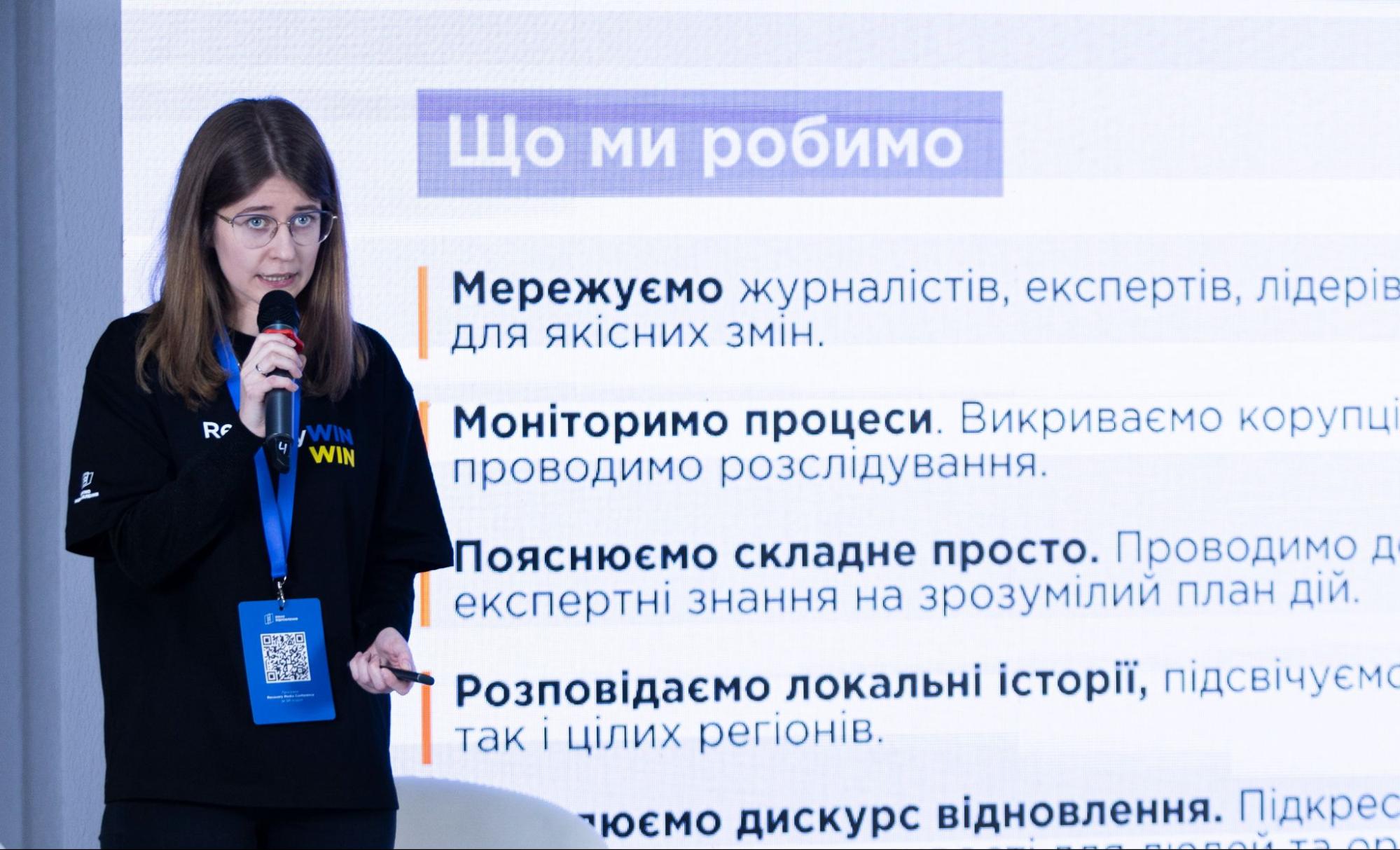
Anastasia Rudenko presents the tasks of the Recovery Window network.
Conference participants discussed the topic of restoration in three main areas. Discussions took place during thematic blocks of the media, representatives of the authorities, and the public sector. The experts discussed the limits of responsibility of each of the recovery participants, factors that may hinder their cooperation and recovery in general, and also considered how to achieve an effective result of interaction.
How the network works: more than 80 participants and its own aggregator site
Seven organizations became co-founders of the network a year ago. The network started working in January 2024, and now there are more than 80 media and non-governmental organizations and analytical centers united by the idea of restoring Ukraine.
They joined the Recovery Window in the first wave of selection and now create multi-genre materials on various aspects of reconstruction in the affected regions, share expertise, plan to create educational opportunities and hold thematic events.
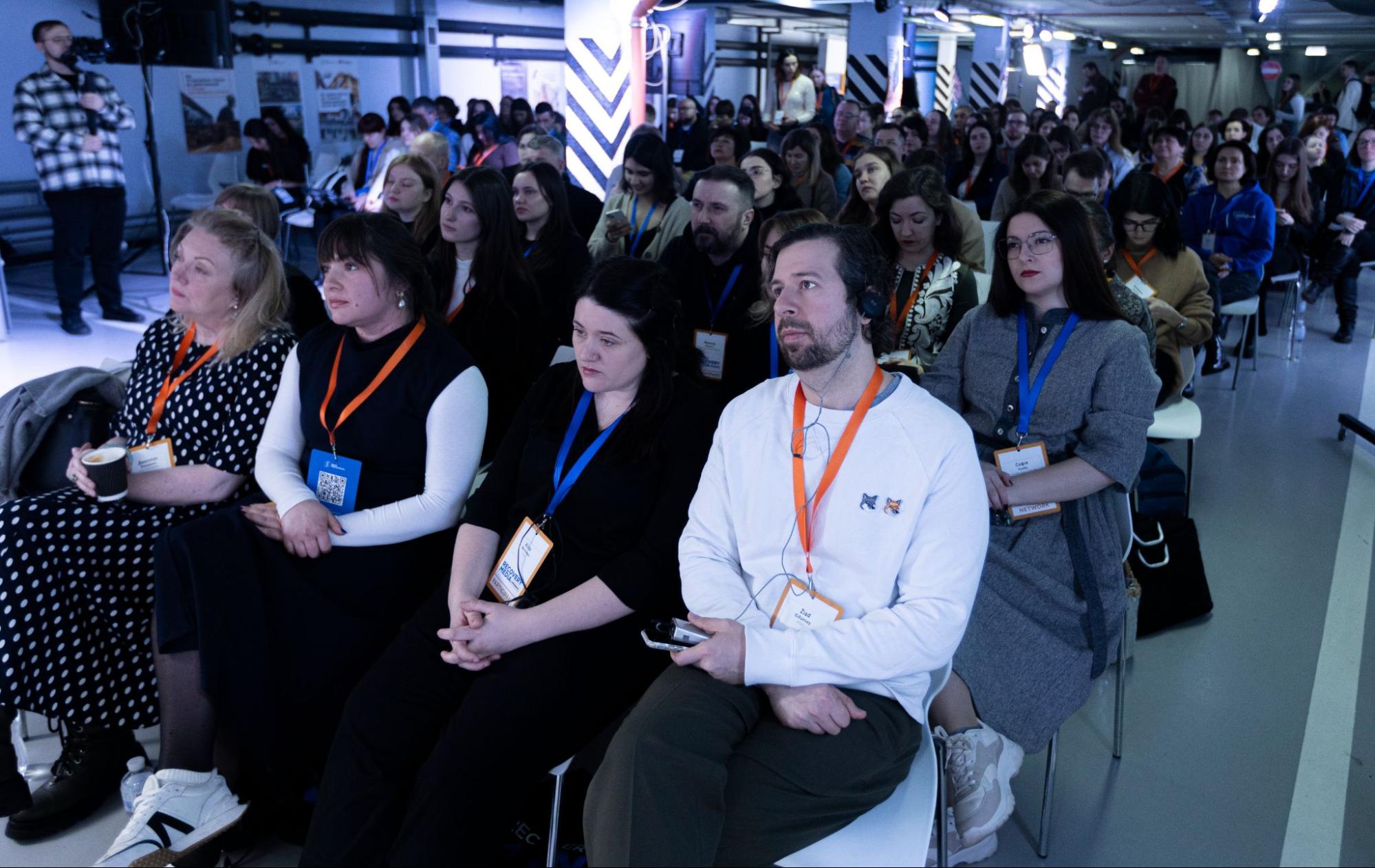
The Recovery Media Conference took place in the shelter of the capital's UBI conference hall.
The government of Great Britain supported the Recovery Window initiative.
"Since the beginning of the full-scale invasion, the United Kingdom has allocated about two billion pounds to the processes related to the recovery of Ukraine," Maryna Bezkorovaina, head of the program for countering disinformation and supporting the development of independent media at the Embassy of Great Britain in Ukraine, said in her speech.
This money was used for several projects: provision of long-term electricity supply to communities, partly for the repayment of arrears for social payments and wages, and for the reconstruction of local communities.
"In this process, journalistic control, the formation of a media agenda around the recovery processes is critical to ensure that these processes take place transparently, efficiently and meet the interests of all those affected by Russia's aggression," Bezkorovaina emphasized.
In addition, according to her, the unique niche of Recovery Window is to produce content that will be an objective, timely, and full-fledged antidote to Russian disinformation.
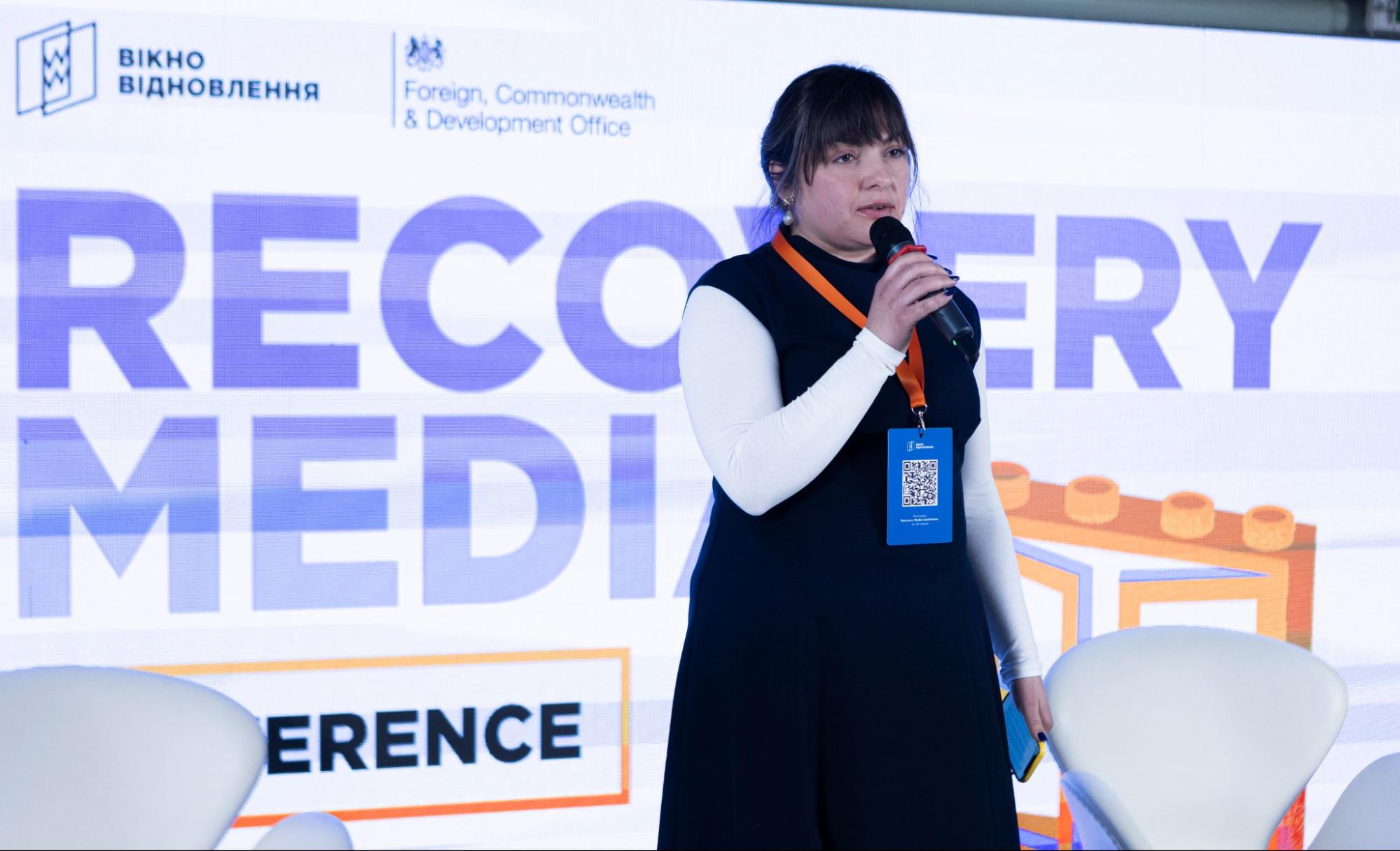
Maryna Bezkorovaina, head of the program for countering disinformation and supporting the development of independent media at the Embassy of Great Britain in Ukraine, gave a welcome speech at the Recovery Media Conference.
During the conference, Rudenko also announced the launch of the Recovery Window aggregator. The peculiarity of the resource is that it collects materials from network participants and leads directly to their pages. Therefore, the reader immediately gets to media websites and primary sources. The site will include not only materials supported by the network but also other news, analytics, reports, recovery instructions, etc.
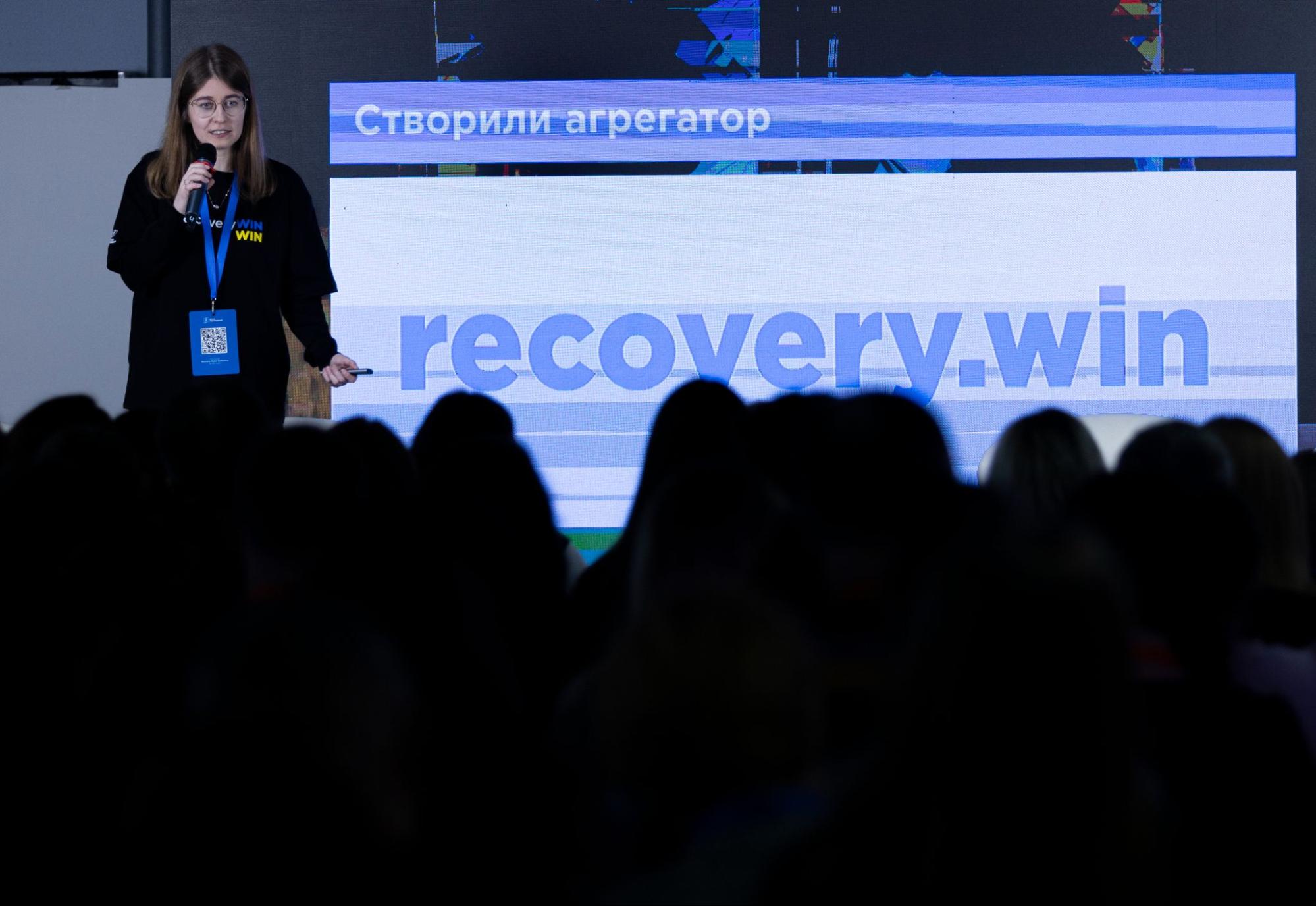
Anastasia Rudenko announces the launch of the Recovery Window aggregator.
Perception of recovery. What do the studies say?
To better understand the topic of recovery and how it is perceived by Ukrainian society, as well as what content consumers need from media professionals and analysts, Recovery Window commissioned two studies: a media discourse analysis and a sociological survey.
Media discourse analysis was conducted by LetsData. The study found media to be a key driver of the recovery theme.
As LetsData machine learning specialist Kateryna Burovova said, the company's specialists analyzed more than 46,000 digital and social media publications and determined that digital media form 77% of discourse.
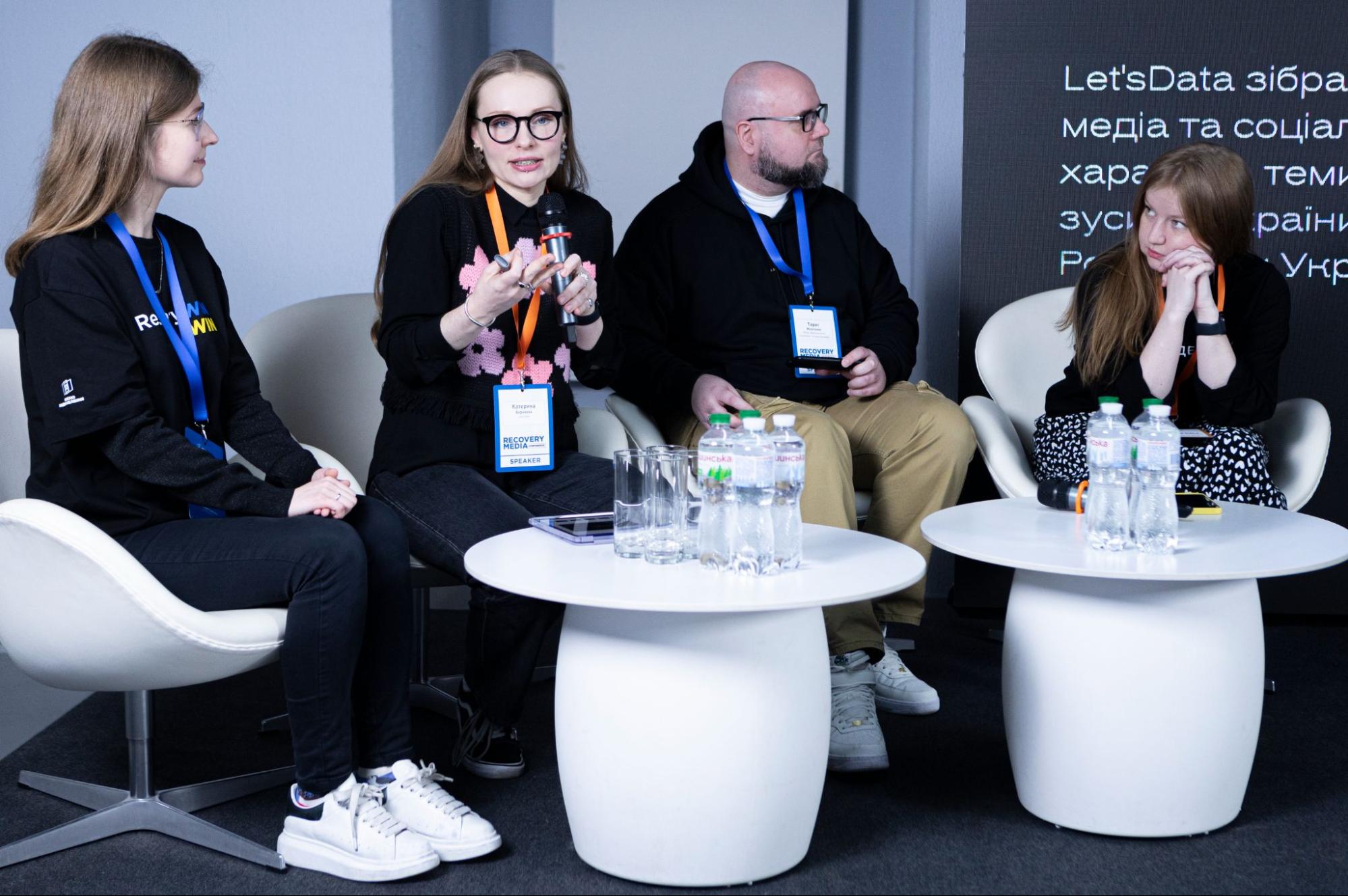
LetsData machine learning specialist Kateryna Burovova (second from the left) presents the study's results at the Recovery Media Conference.
The study also shows the multidimensionality of the recovery topic — LetsData singles out 19 aspects. As expected, physical reconstruction dominates — about 44% of the analyzed publications in the media and social networks Facebook, X, and Telegram relate specifically to the restoration of homes, bridges, schools, and medical institutions. In addition to infrastructure and housing, the top five dimensions include health care, education, and the environment.
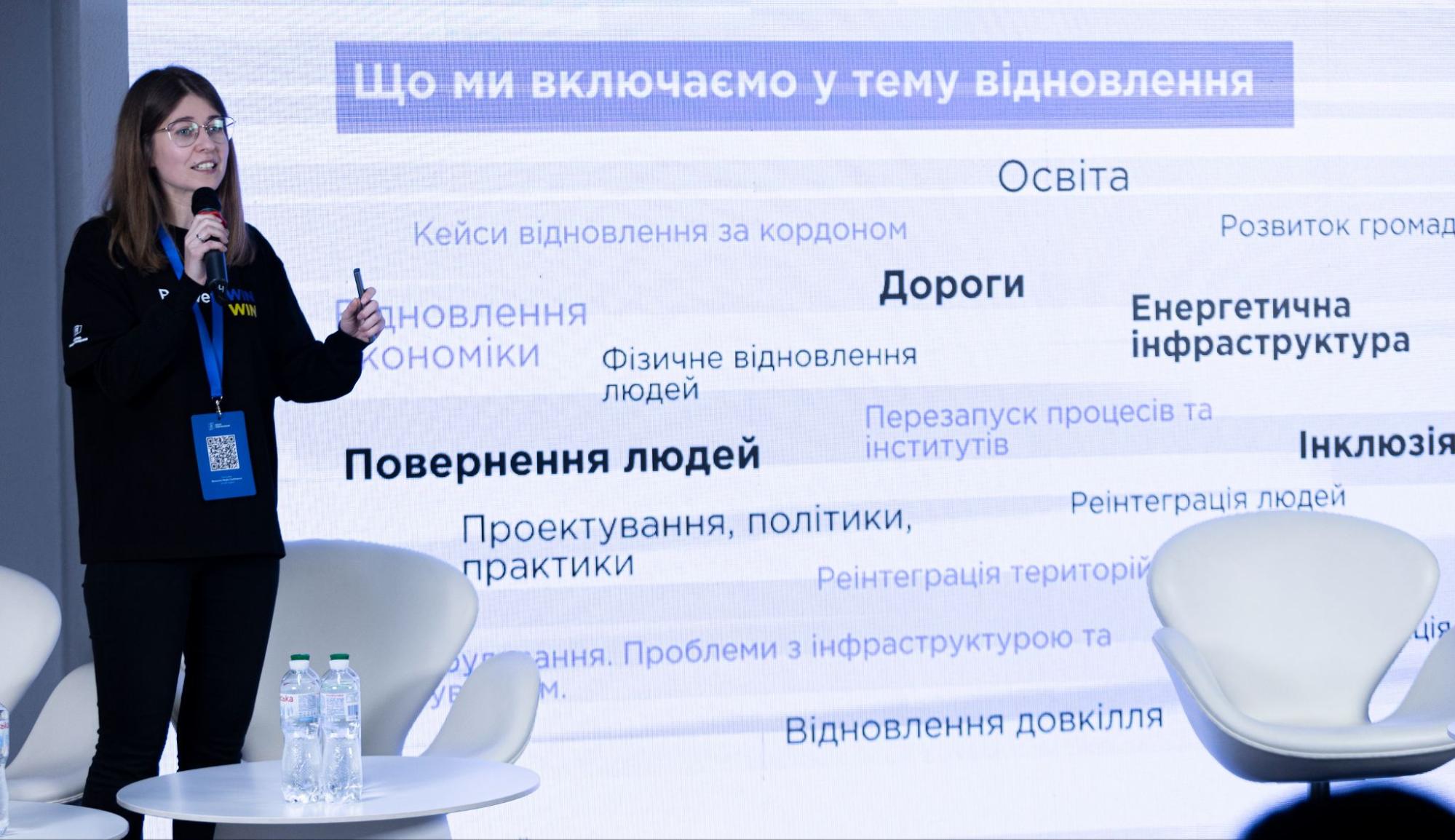
Recovery Window coordinator Anastasia Rudenko tells what the network invests in the concept of recovery.
Burovova spoke about the main hopes and fears seen from the analyzed publications. Ukrainians seek to restore the damaged infrastructure and create a new one. Emphasis is also placed on sustainable and inclusive recovery.
The analysis of publications also proved that Ukrainians hope to attract international investments and revive local businesses. They want to enter global markets and implement modern technologies and digital tools.
The main fear of reconstruction is corruption. The demand for transparency, accountability, and systemic communication runs through all aspects of recovery. The consequences of corruption can be delays and deficiencies in construction, insufficient support for victims of war, and barriers to equal opportunities.
"Recovery is a really multidimensional discussion. The recovery topic is one of the most dominantly productive topics we've ever analyzed as a team. It is important that it remains so and does not fall into the hands of malicious actors," Burovova concluded.
Another study was presented by the network partner, the Ilko Kucheriv Democratic Initiatives Foundation. It shows that most Ukrainians believe in restoring Ukraine's pre-war socio-economic potential. "Yes" answered 32.3% of respondents, "rather yes" — 36%.
At the same time, the majority of respondents understand that reconstruction will take a long time. 21% of Ukrainians believe it will last from five to eight years, 21.7% — more than 10, 17.8% — up to 10, and up to 5 — 16.5%.
The respondents give a key role in the future reconstruction to the Ukrainian government (53.1%) and allied states (51.5%). Less responsibility is given to local self-government, business, and volunteers — 35.8%, 33.4%, and 28.3%, respectively. At the same time, more than half of the respondents (51.7%) are dissatisfied with how the state is currently restoring their housing or the housing of their relatives or friends, noted Taras Zhovtenko, an analyst at the foundation.
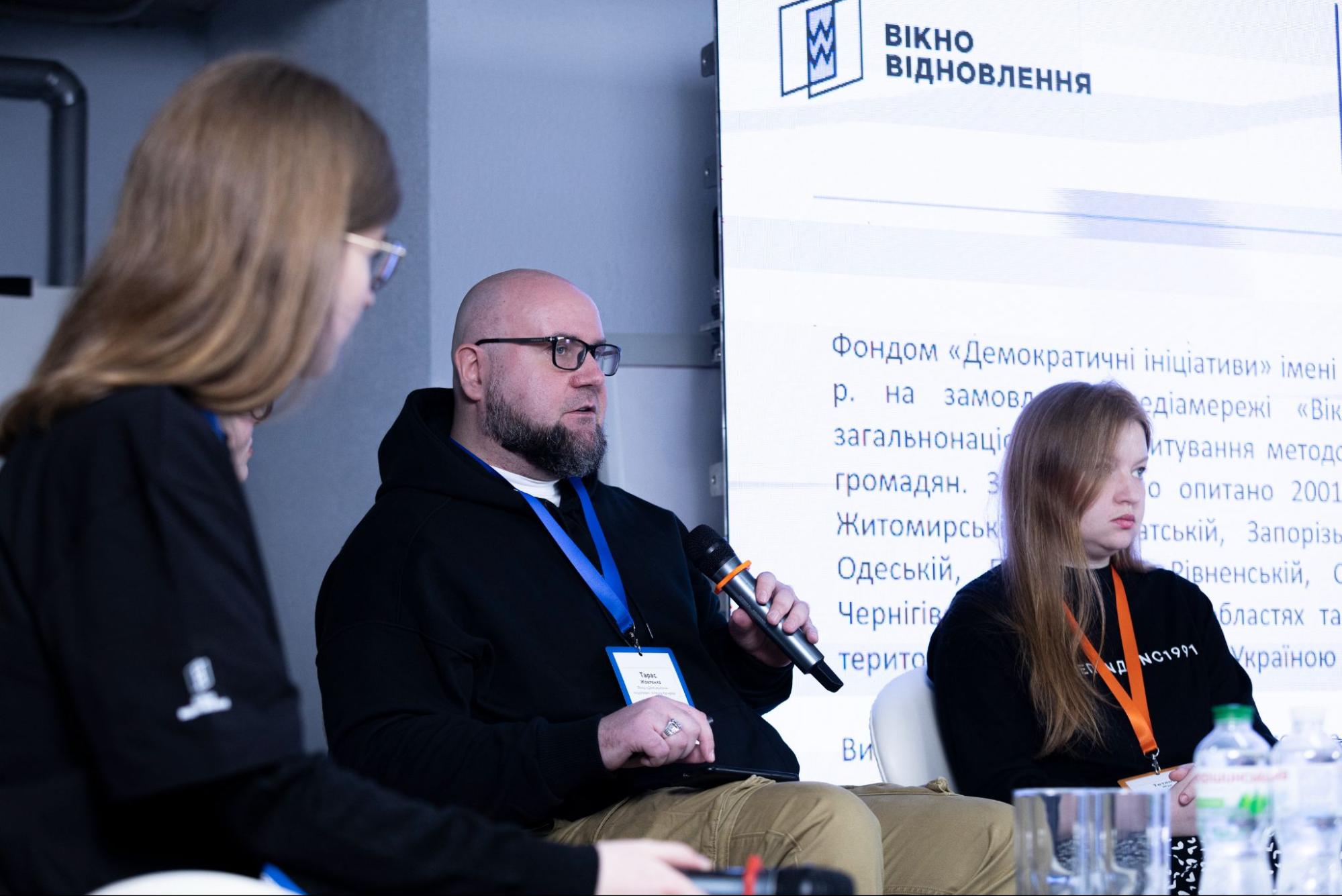
Taras Zhovtenko, analyst of the Ilko Kucheriv Democratic Initiatives Foundation.
According to the respondents, the main factors that can prevent the rapid reconstruction of Ukraine are the massive scale of destruction caused by the war (69.8%), embezzlement or misappropriation of allocated funds by representatives of central authorities (58.1%), and representatives of local authorities and self-governments ( 51.9%) and lack of professionals in power (36.4%).
How do the co-founders of the network already write about recovery?
The representatives of the media founders of Recovery Window shared their experience of covering the topic of recovery. Serhii Nikitenko, editor-in-chief of MOST media outlet, said that the issue of demining is the most important for the residents of the Kherson region. For them, the possibility of agricultural activity prevails over the reconstruction of housing.
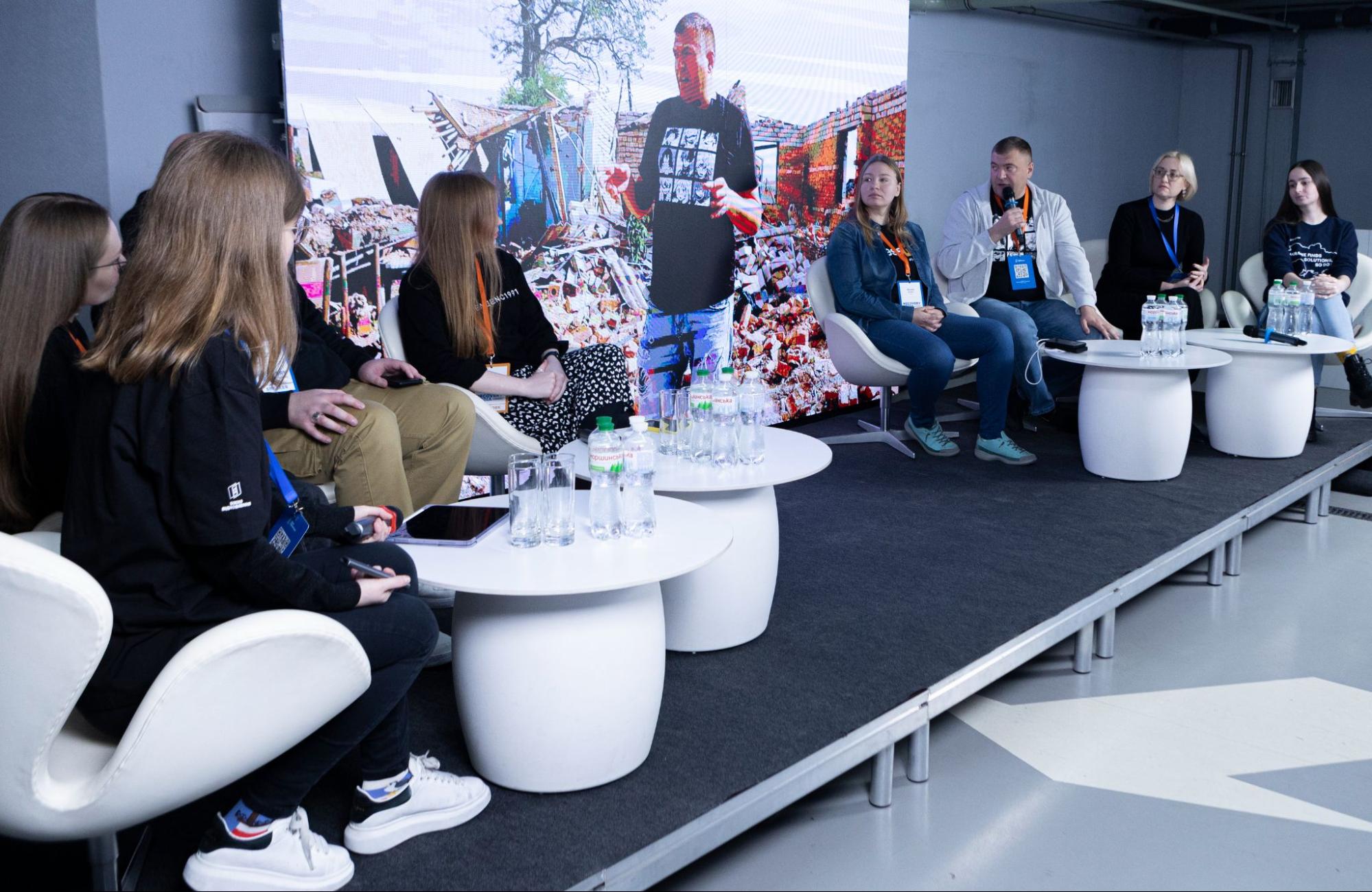
Serhii Nikitenko (with a microphone) talks about a video from the completely destroyed village of Sukhyi Stavok in the Kherson region.
Using the example of the completely destroyed village of Sukhyi Stavok, Nikitenko explained another vital aspect — not everything will be restored, and this should be communicated to the citizens.
This is a unique village, and there are only two streets. I think there was no life there even before the war, but people say they want to and will return. This is a tragedy because the regional authorities and the state have still not communicated the issue that this village will not be restored.
A representative of the Nakypilo media group, Olena Leptuga, noted that the editorial team tries to look at restoration broadly. For example, when Russia hit the Kharkiv oil depot, they covered the topic from the environmental point of view as well. Journalists reported on the state of polluted water and the solutions offered by businesses and the civil sector.
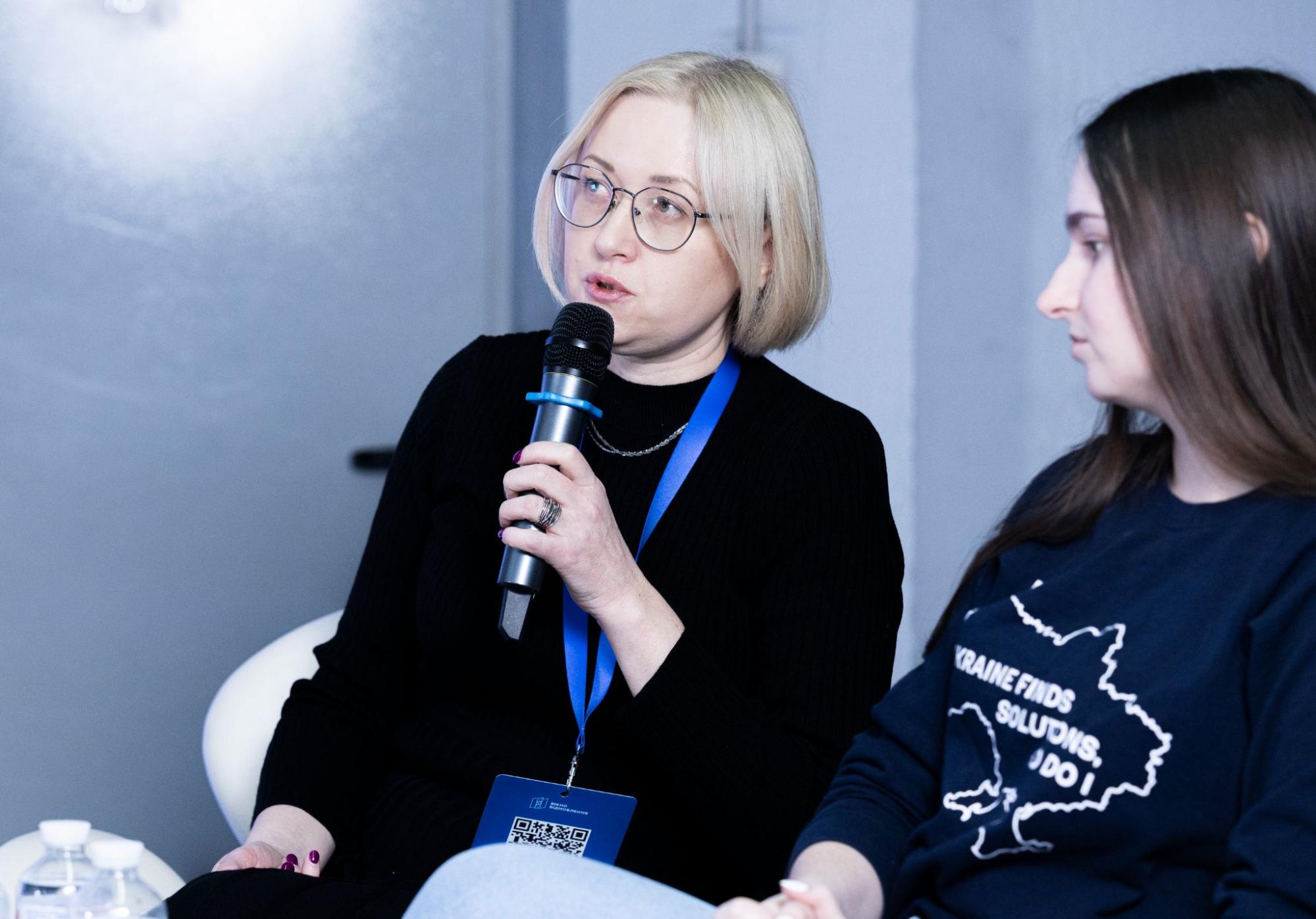
A representative of the Nakypilo media group, Olena Leptuga, talks about the experience of covering the topic of restoration.
Nakypilo also tries to find topics that will be relevant in the future. For example, the Institute of Prosthetics is returning to Kharkiv, so journalists are already developing a series of materials about it. They will write about how Ukrainian defenders undergo rehabilitation through the prism of the experience of specific people.
"Not to look at the wall with no way out, you look out the window" — this is how Leptuga defined the goal of Recovery Window.
The Intent media outlet also writes about the restoration experience. With their materials, they want to show that there is a future. For example, writing about a business that, despite difficulties, wants to work for the benefit of its community and develop and about those who, after the destruction, take a new loan and still believe that everything will work out for them.
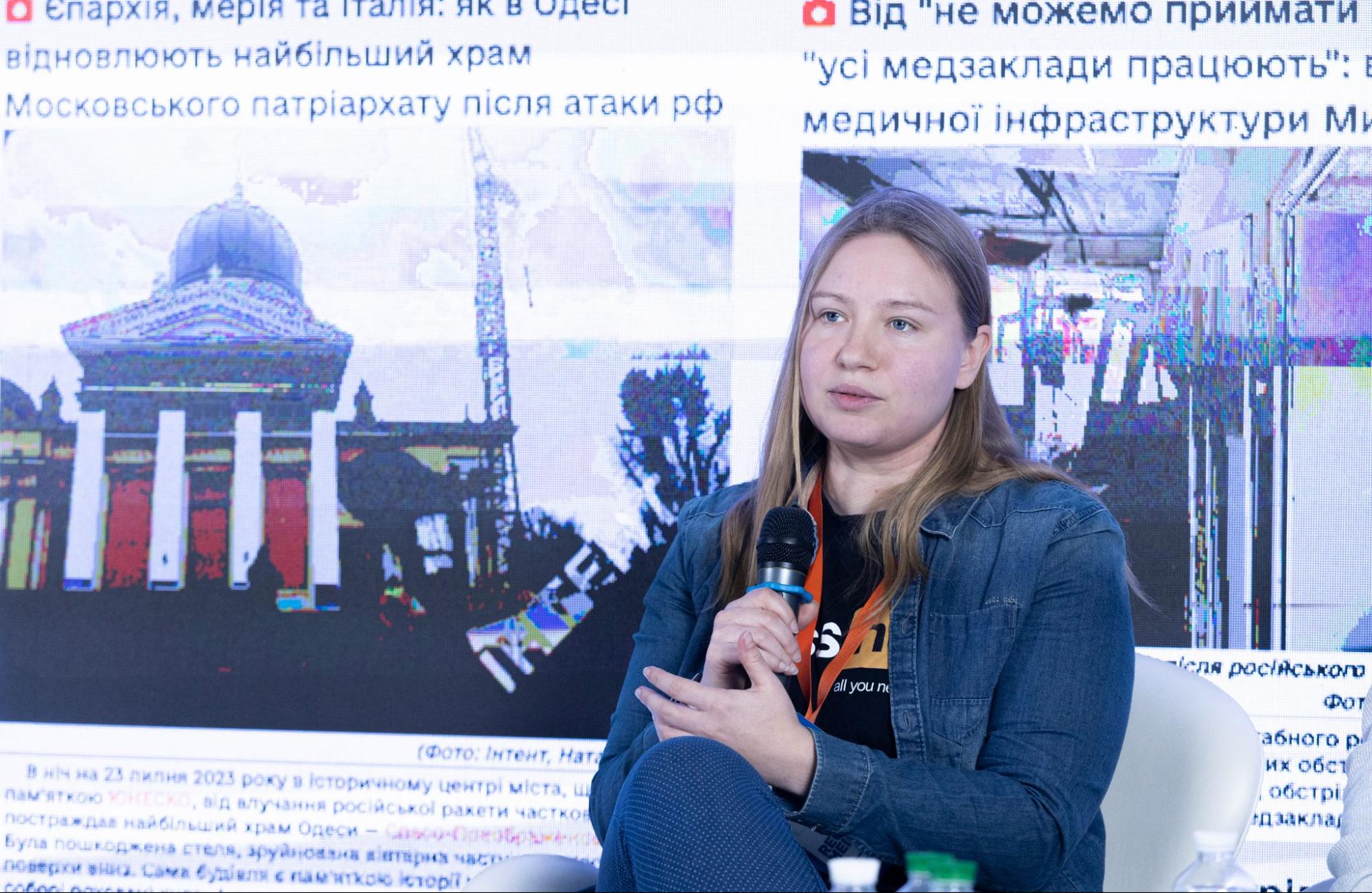
Natalya Dovbysh, a representative of the Intent media outlet, speaks about the materials of her colleagues on the topic of the restoration of the southern regions.
"We are mediators. We have to put everything through ourselves and show people everything will be fine — we are working, and the government is working. If the government does not work, then we will help it to work," says Natalya Dovbysh, a media outlet representative, about the purpose of the journalists' work.
Tetyana Zhuk from Eastern Variant, who writes about Donetsk and Luhansk regions, also shared her experience. This media outlet's journalists, despite constant shelling and advancing Russian forces, continue to write about the recovery. Yes, reconstruction here is not as large-scale as in other regions, but it is also being done.
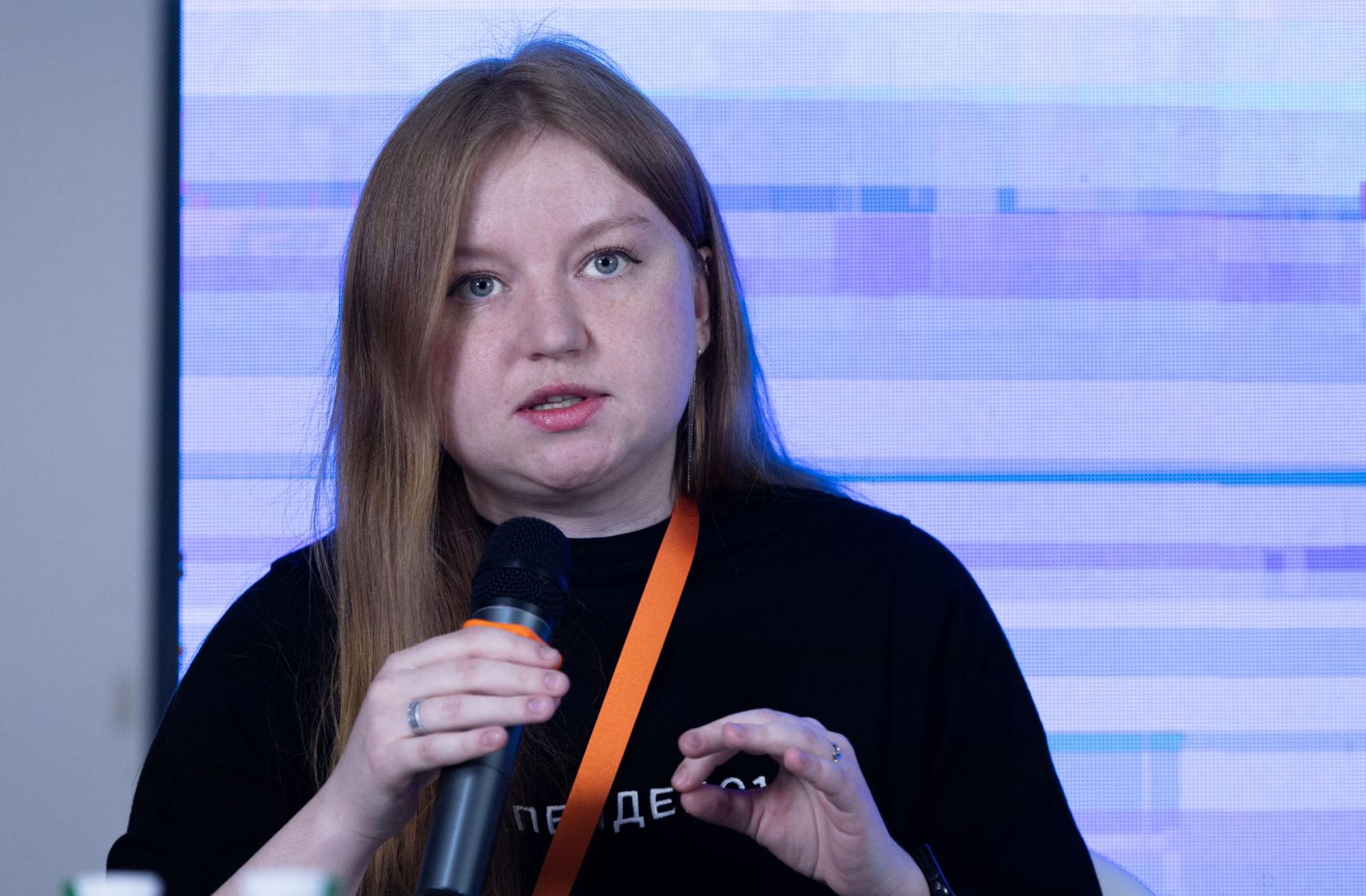
Tetyana Zhuk, a representative of the Eastern Variant media outlet.
Reconstruction in the Donetsk region is mainly reduced to covering windows with plywood, distributing humanitarian aid, or supplying generators and gas stoves. However, the editors are convinced that this is also extremely important. At first, journalists reported on such small steps taken in the liberated Lyman. Later, they assessed the housing stock there and overhauled some buildings. Therefore, Eastern Variant continues to inform about recovery in the challenging conditions of Ukraine's East.
Mariia Smyk, Rubryka's senior editor, spoke about the usefulness of solutions journalism in reconstruction, the main task of which is to answer the question — how? Although Rubryka does not know "how to end the war" or "how to stop the destruction", it already answers the question "how to help."
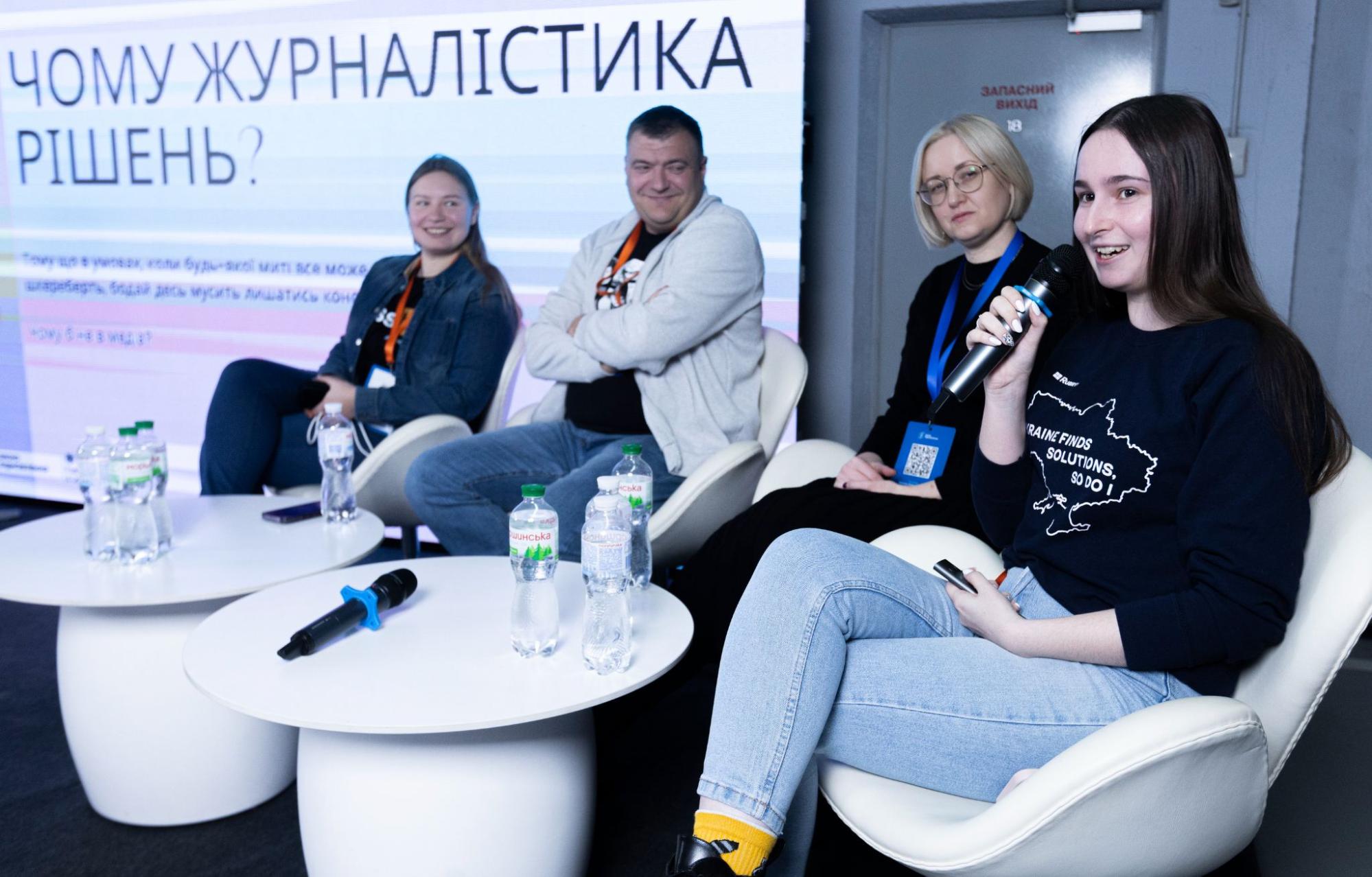
Rubryka's senior editor, Maria Smyk (with a microphone), tells how solutions journalism can cover the topic of recovery.
The media outlet divides its audience into three categories. The first is those who need help. Now, they mostly speak about the victims of Russia's aggression. The second one includes those who are ready to help. The third category encompasses those who can change something or have the power to start some projects.
How to define areas of control and tools of interaction with the authorities?
The microphone has shifted from those covering reconstruction to those directly making decisions about it. The moderator of the discussion, Anastasia Ivantsova, asked the panelists what internal problems, in their opinion, hinder Ukraine's reconstruction.
Mustafa Nayyem, the head of the State Agency for Reconstruction and Development of Infrastructure of Ukraine, Maryna Denysiuk, the senior project manager of the reconstruction department of the Office of Reforms of the Cabinet of Ministers of Ukraine, and Mykhailyna Skoryk-Shkarivska, the Irpin City Council representative, took part in the discussion.
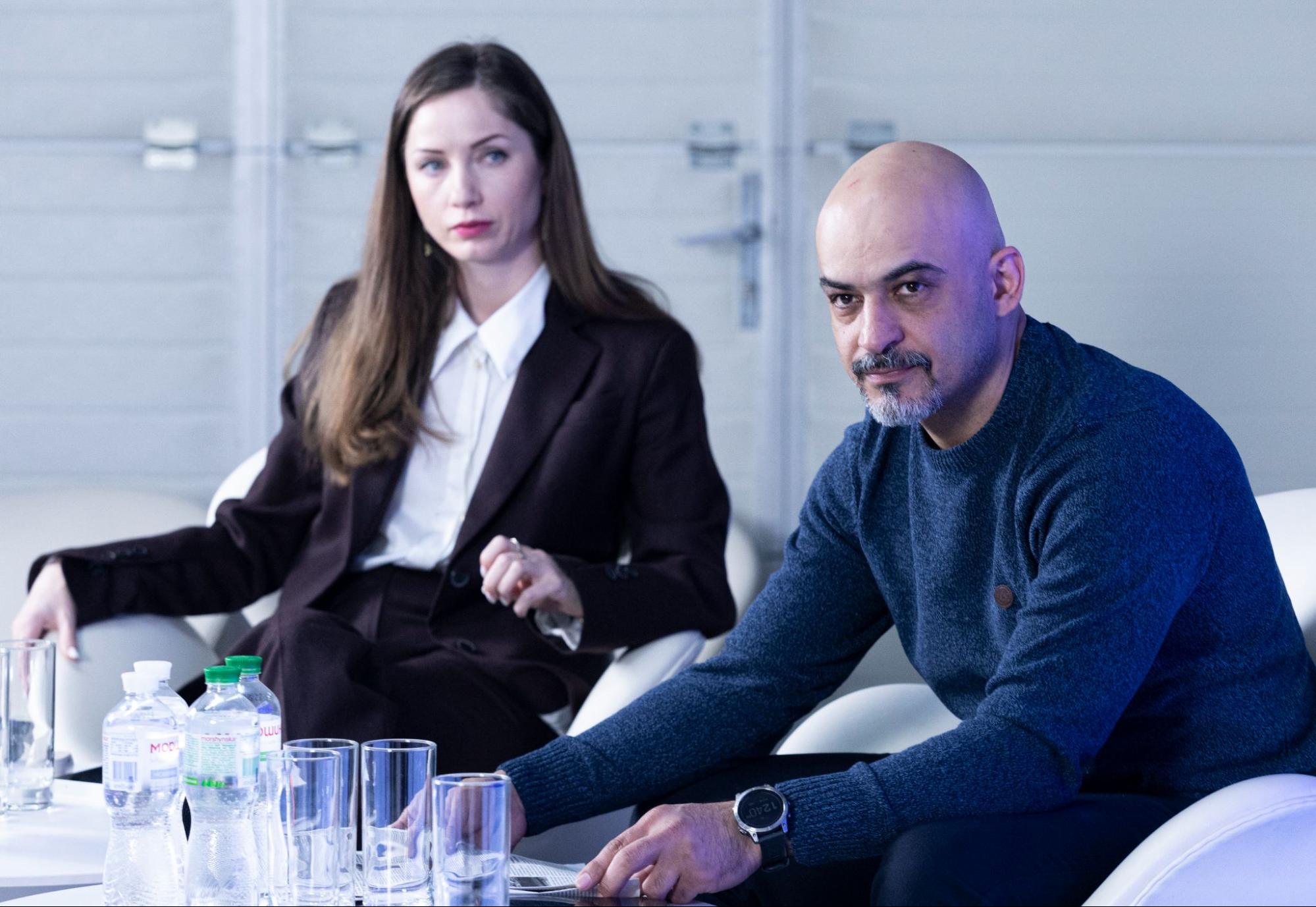
Speakers of the second block of the conference — Maryna Denysiuk and Mustafa Nayem.
The biggest problem for the recovery of Ukraine is the lack of money. According to the Ministry of Finance calculations, about $486 billion are needed to restore Ukraine. Ukraine's economy can cover part of these costs, but in order to launch it, the state must support small and medium-sized businesses as the basis of the economy.
According to Denysiuk, senior project manager of the restoration department of the Office of Reforms of the Cabinet of Ministers of Ukraine, Ukrainians have great entrepreneurial potential. However, the main problem is that Ukrainian businesses do not have support either at the level of the government or at the level of the regions. Changing this attitude will stimulate not only development within the country but also allow entry into other markets. This, in turn, will positively affect the state of the economy.
However, Ukraine will not be able to cover all costs independently, so it is necessary to attract international investments. This requires trust in the central and regional authorities. Authorities agree that corruption is a big problem, and international partners pay attention to it. In order to attract investments from abroad, Ukraine needs to overcome this issue.
Government representatives call low wages one of the corruption risks. If a person receives a meager monthly salary and at the same time signs contracts worth hundreds of millions of hryvnias, they will always be tempted to break the law. The government cannot control thousands of such workers nationwide. However, it can create conditions under which specialists will receive decent salaries and not seek additional profit in corruption schemes.
At the same time, trust within the country, between the authorities and citizens, is equally important. Nayyem explains that the restoration that is already happening must be properly communicated to society. People should understand what exactly they are doing and why.
"You often have to explain obvious things. For example, there is a bridge in Irpin, which we rebuilt last year. Everyone who lives there drives it. But when we opened it, we received a barrage of criticism from people who didn't understand why we did it. It was a shock for me because this bridge connects tens of thousands of people with the capital," says Mustafa Nayem.
People from other regions may criticize the government's decisions because they do not trust it and do not understand the importance of its decisions. Cases similar to the situation with the Irpin bridge are also occurring in other regions. As a result, most Ukrainians criticize and perceive any recovery as "out of time," noted Nayem. However, the residents of the affected settlements need solutions today.
Incorrect communication or its absence can also affect the course of military operations. For example, society often criticizes the repair of roads as unreasonable amid war. However, Nayem explains that high-quality roads are needed to transport the wounded quickly and supply ammunition. That is why repairing some objects right now is a necessary component of the war.
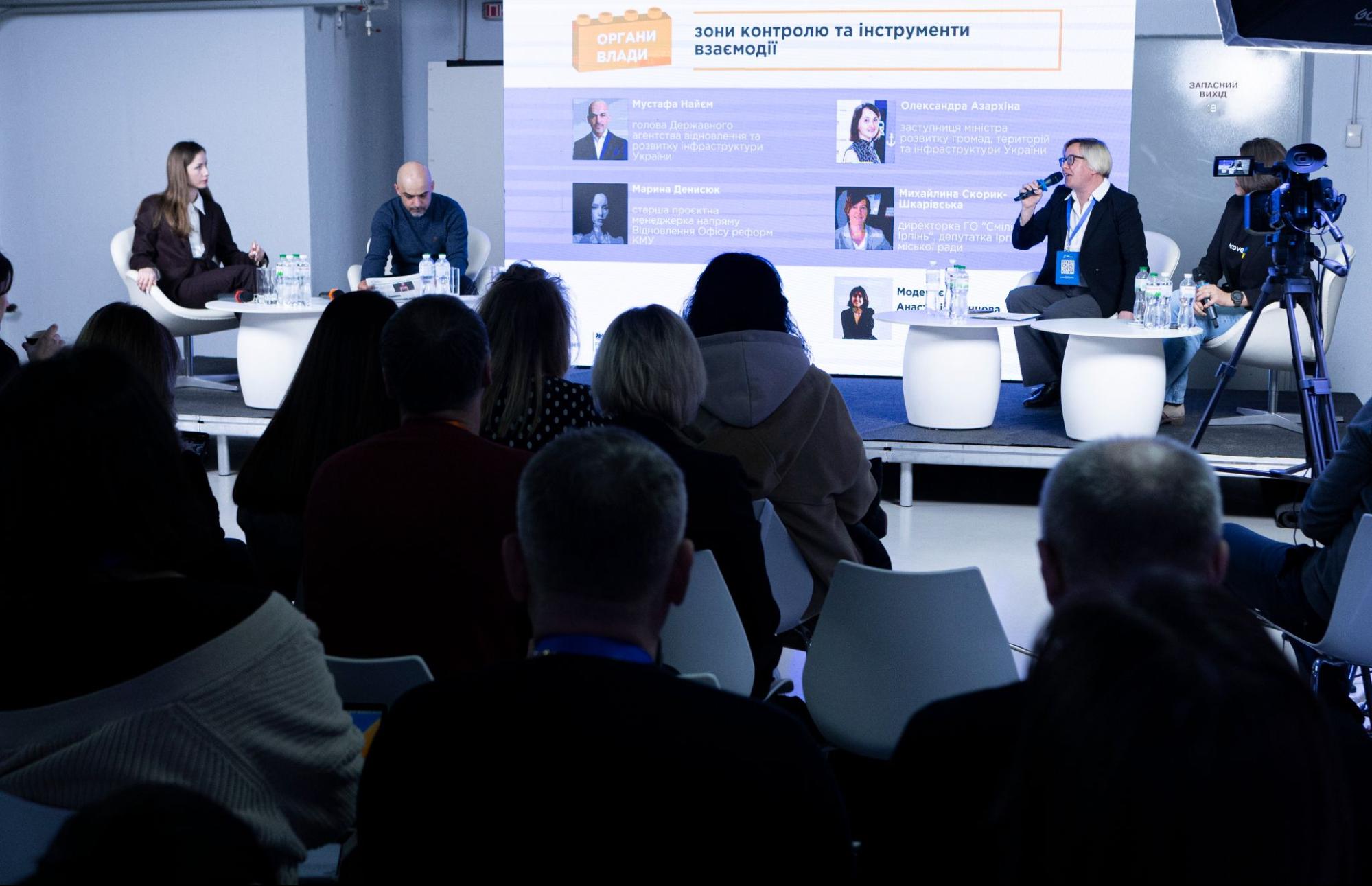
The second block of the conference "Government bodies: areas of control and tools of interaction."
Skoryk-Shkarivska, a representative of the Irpin City Council, says another problem with reconstruction is when a temporary solution turns into a permanent one. She explains this problem using the example of the village of Moshchun. At the beginning of the invasion, active battles were fought there, and many houses were destroyed. When Ukrainian troops liberated the village from Russian forces, they built temporary homes for the residents who remained. But the problem is that locals still live in them.
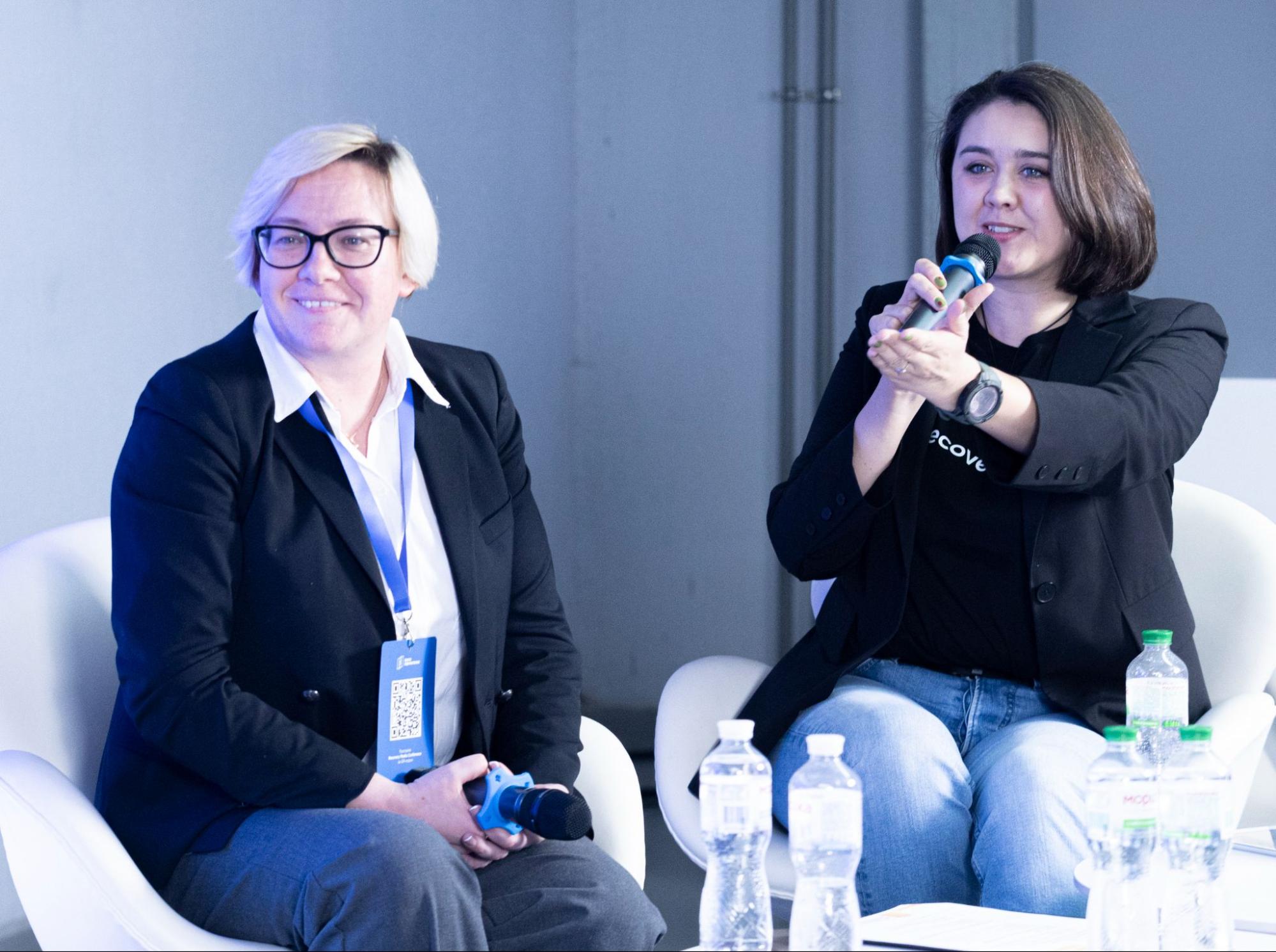
Representative of the Irpin City Council Mykhailyna Skoryk-Shkarivska and host of the conference Anastasia Ivantsova.
Communities also encounter problems in cooperation with international organizations. Skoryk-Shkarivska gave an example: in May 2022, international organizations came to the liberated Kyiv region and offered help. Local officials expected they would receive the money next month, and in September, they could repair and open several schools. However, the partners started vacations and planned rotations. The reconstruction process dragged on for a much longer time. Therefore, you should consider the specifics of working with international partners and accordingly restructure your activities to be straightforward and convenient in interaction.
Another obstacle to recovery is the lack of high-quality design. Nayyem explains that the reconstruction project is not just an idea but a detailed plan. The initiator must have a project and estimate documentation indicating the expected cost, time for implementation, and benefits from the project.
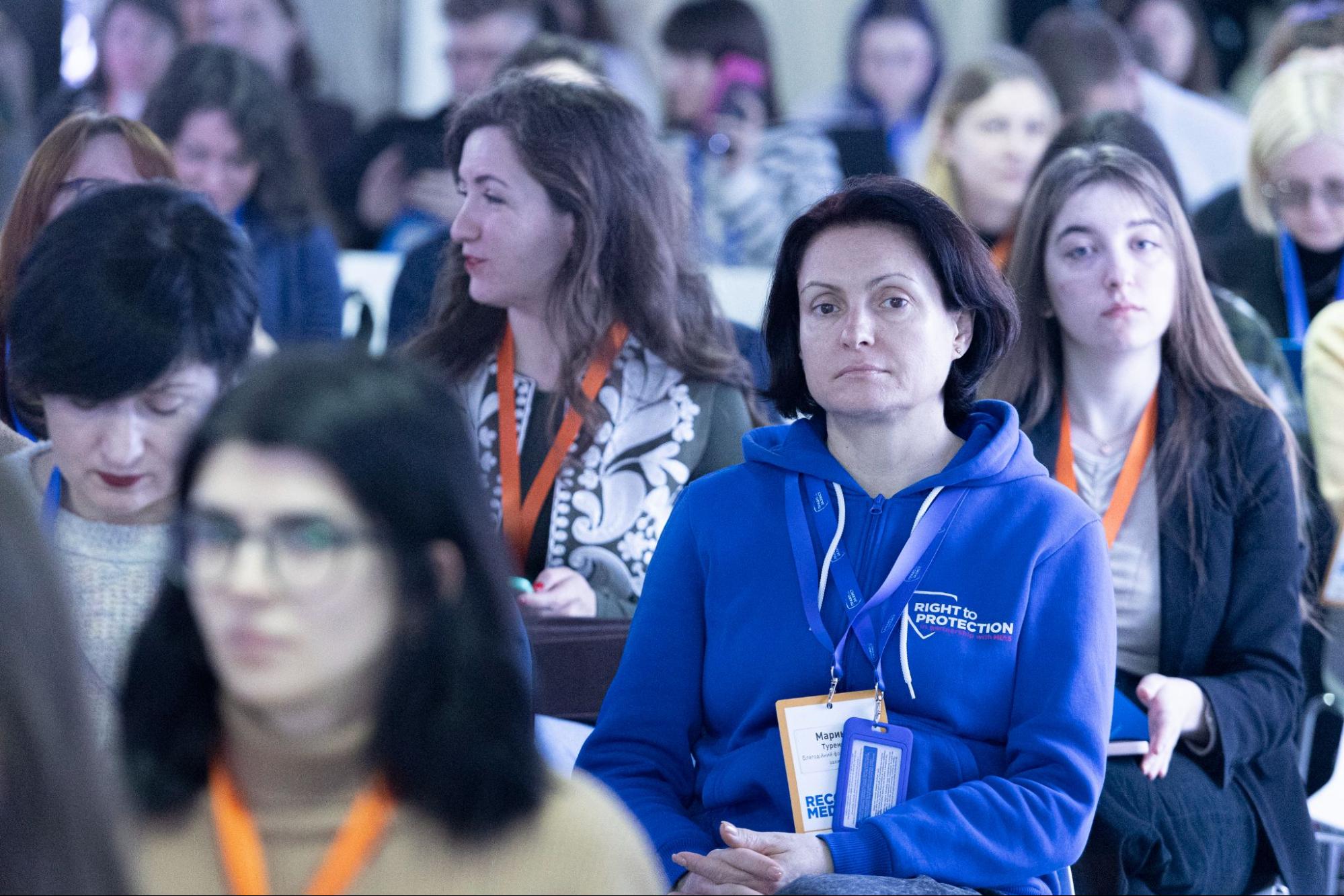
Recovery Media Conference audience.
Another problem is the lack of project managers. Due to this, there are difficulties with the distribution of funds — it happens that there is money, but it is not used on the ground. According to Nayyem, at the end of 2023, a lot of money was left in some local budgets that were supposed to go to reconstruction. The authorities did not have enough specialists to deal with purchases, structure this money, and control contractors.
Ultimately, the authorities identified areas that need to be developed to achieve a high-quality recovery. Officials must be honest with citizens, help businesses, communicate transparently with society, and have a staff of highly qualified specialists in the field of reconstruction with decent salaries.
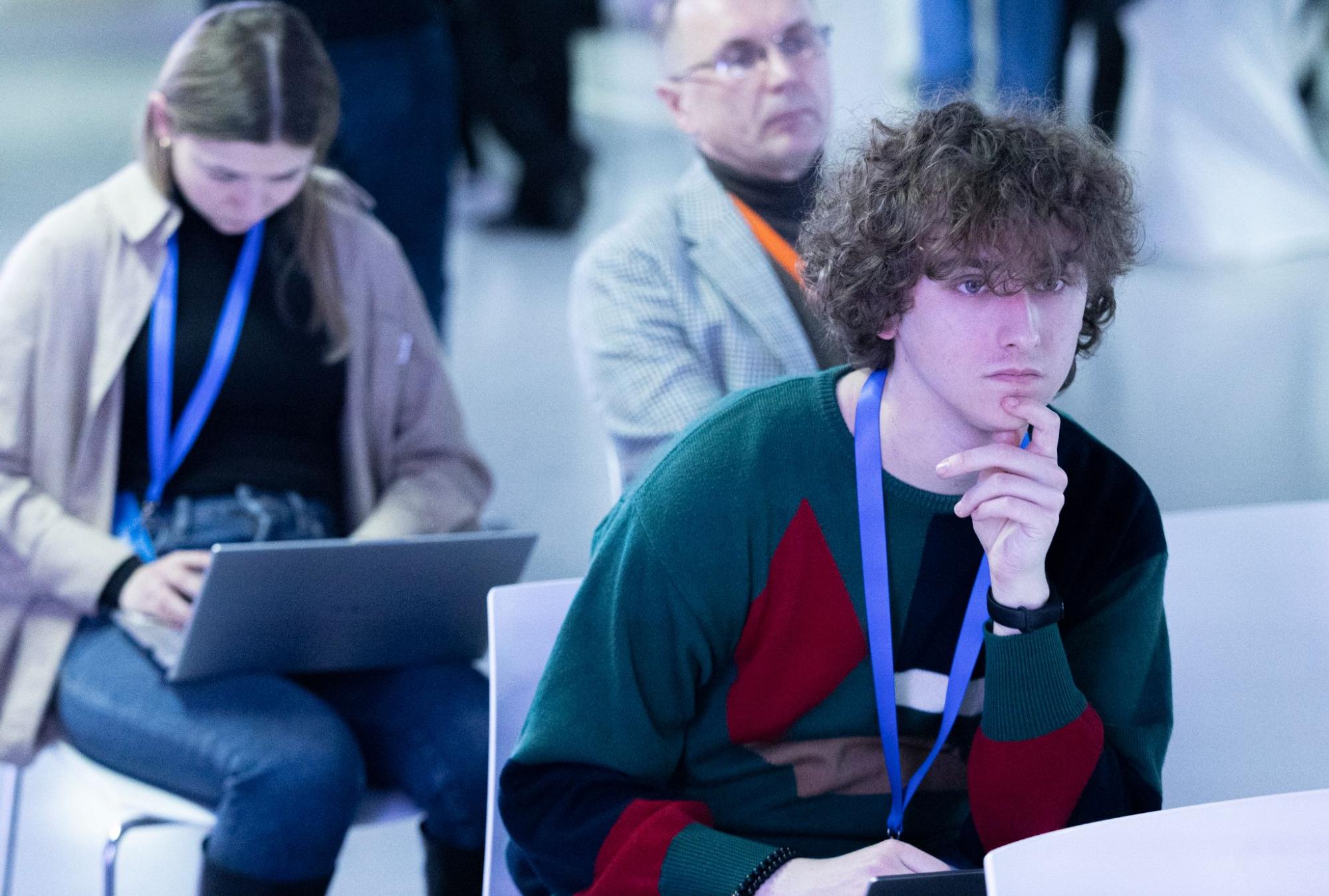
Recovery Media Conference audience.
Solutions from the public sector: what already works?
Public sector representatives discussed the role of think tanks and non-governmental organizations in rebuilding Ukraine. They talked about how their initiatives are already restoring different areas of life.
Marta Benyshyn, the head of the NGO "Building Ukraine Together," spoke about the organization's experience. She emphasized that its philosophy is to involve young people in the state's recovery processes. "BUT" brings life back to places where national initiatives do not reach and simultaneously uses construction as a tool around which people can be united.
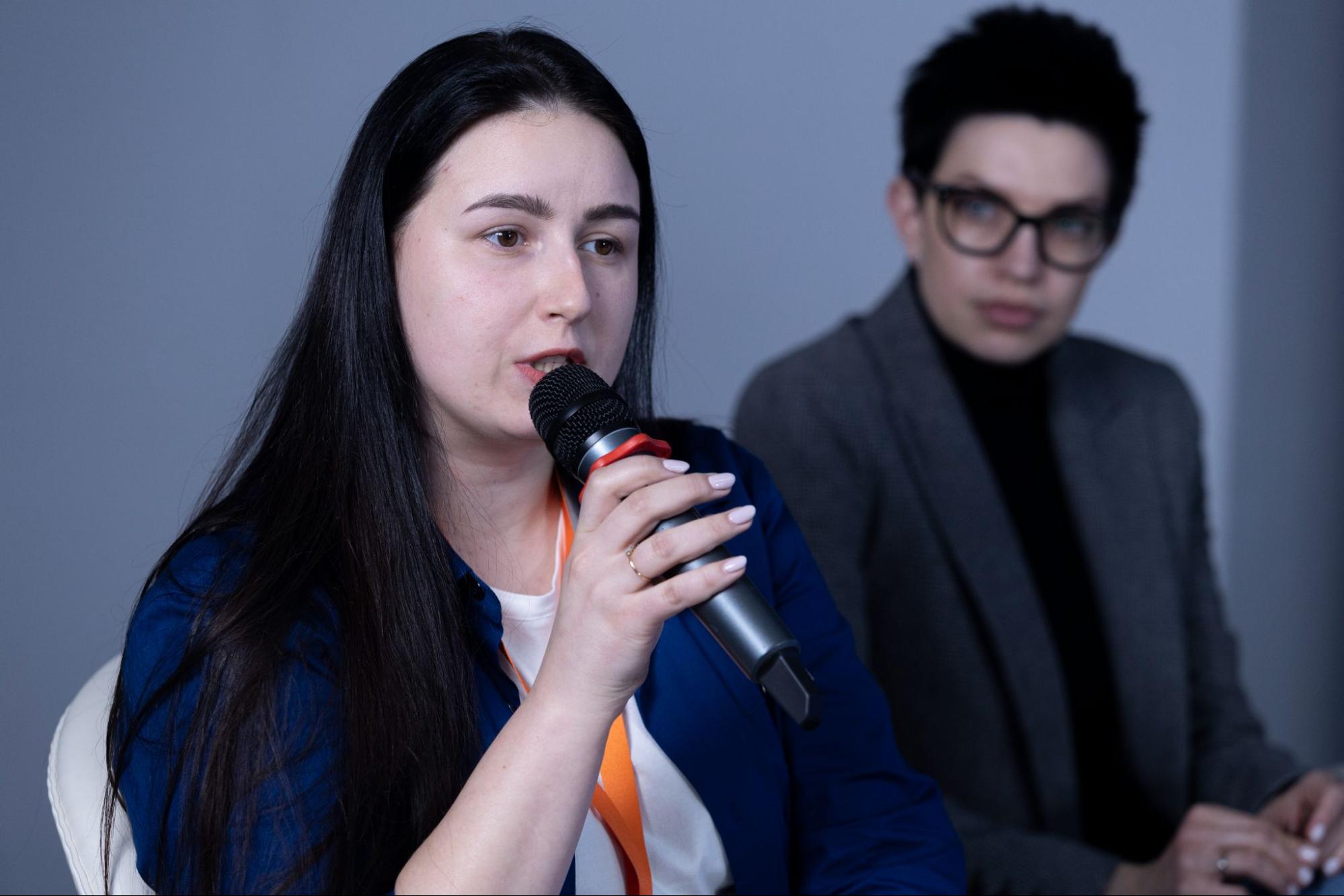
Head of the NGO "Building Ukraine Together" Marta Benyshyn.
"BUT" also organizes trainings and cultural events in communities. For example, it teaches people to trust state institutions and explains how to cooperate properly with them. Their activities show that if you want to live here, you can improve the environment around you.
Lilia Drozdyk, a representative of the SavED Charitable Foundation, spoke about how to restore education. Their work began after the liberation of the Chernihiv region. There were 25 damaged or completely destroyed schools in the region. The fund immediately realized that their recovery would be expensive. Therefore, the team decided not to rebuild the buildings themselves but to restore access to education itself, one of the fundamental rights of children.
The foundation found a solution in digital education centers. They will not replace traditional educational institutions, but they will quickly restore access to knowledge in war-torn territories. The team is convinced that every child has the right to education, so they operate mainly in small communities, which international donors usually do not reach.
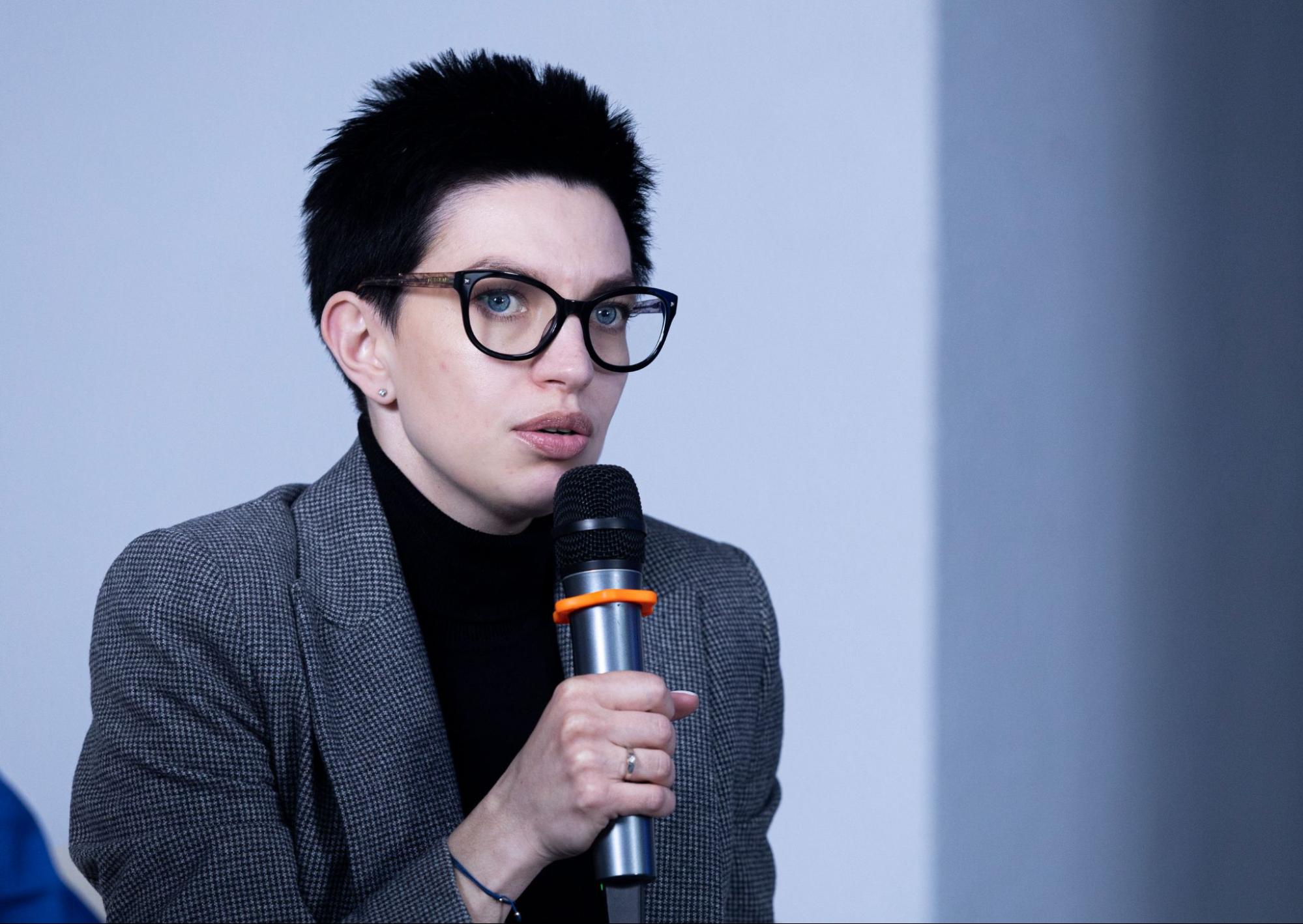
Liliшa Drozdyk, representative of the savED charity fund.
A DiXi Group analytical center representative, Lyudmila Rosik, reminded that their team has been promoting energy reforms in Ukraine since 2008. Currently, the center, among other things, is working on a project that will allow Ukraine to restructure its foreign debt and direct these funds to green projects. For this, analysts study the experience of other countries in reconstruction, prepare various analytical materials, and advocate for them before international partners.
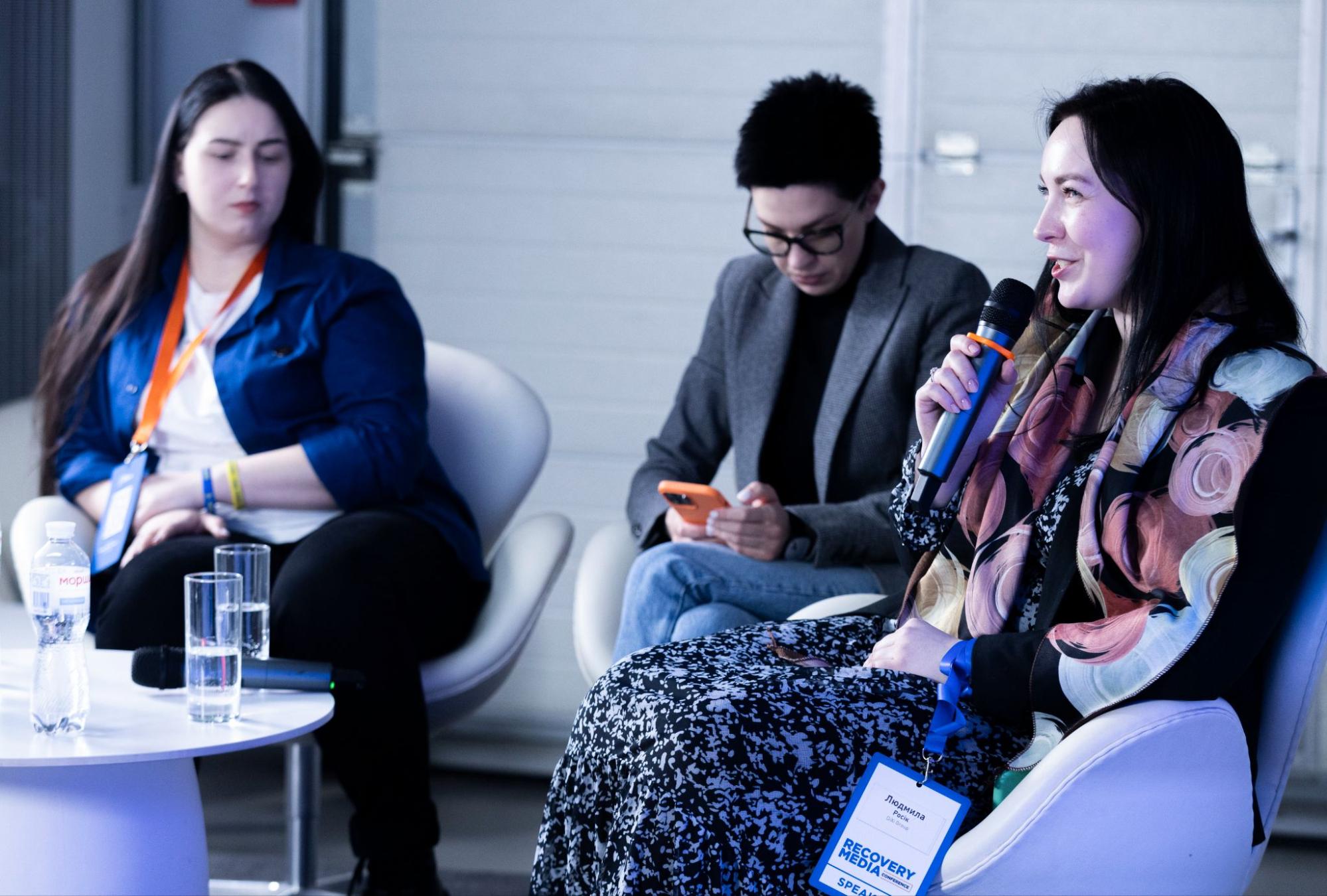
Lyudmila Rosik, a representative of the analytical center DiXi Group, with a microphone.
DiXi Group also promotes Ukraine's European integration. They are part of the team that is creating the national energy and climate plan, which is one of the conditions for joining the EU. Rosik says that Ukraine has only half a year for this, although other states were usually given two years for development. However, she assures them they will cope with this task even in a short period.
Yevheniia Stadnik, representative of the Center for Democracy and the Rule of Law, spoke about the role of analytical centers in the restoration. In particular, their team is engaged in the development of independent media. Stadnik stressed that media outlets have also been affected by the war — journalists also need support.
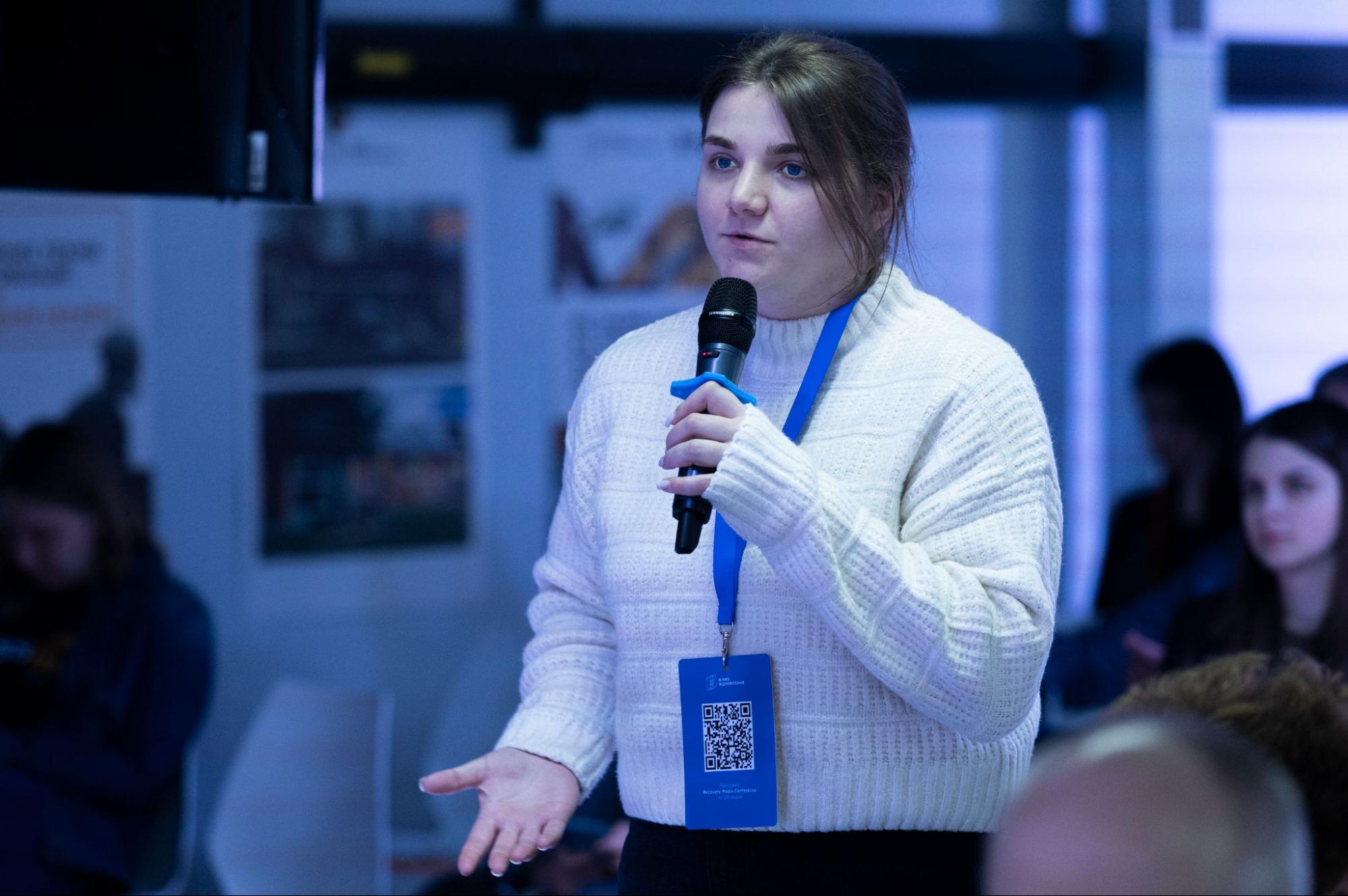
Questions from the ZMIST media to the speakers of the third panel.
"Our main activity is that we conduct trainings for journalists on a large number of different topics. We also support them legally by providing free consultations. In general, we try to respond to journalists' requests for any need they have," says Stadnik about the center's activities.
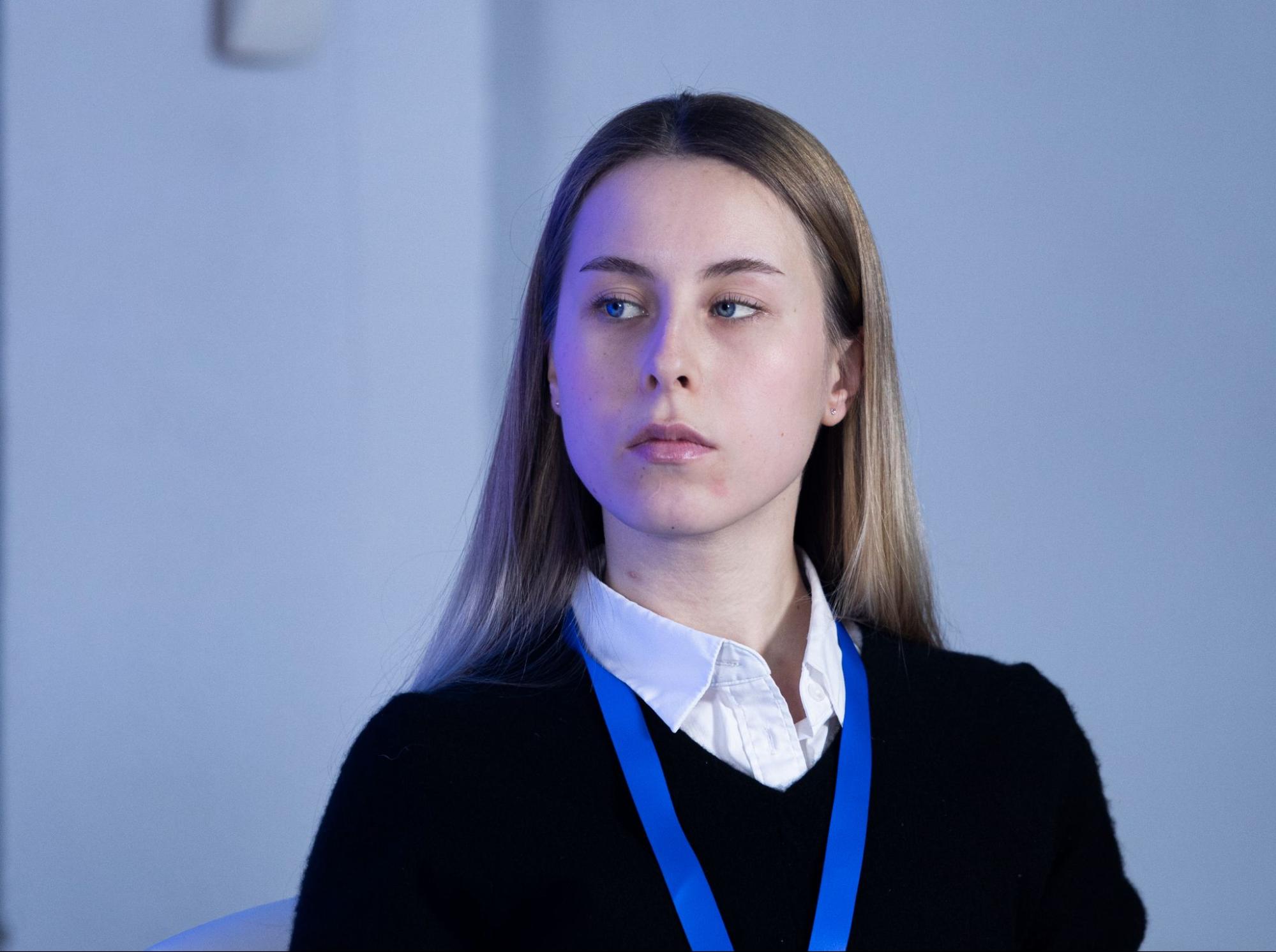
Yevheniia Stadnik, a representative of the Center for Democracy and the Rule of Law.
NGOs and analytical centers help the state where it cannot cope. The civil sector can support a small community that the state has not helped, restore part of the infrastructure, and help residents rebuild the community independently.
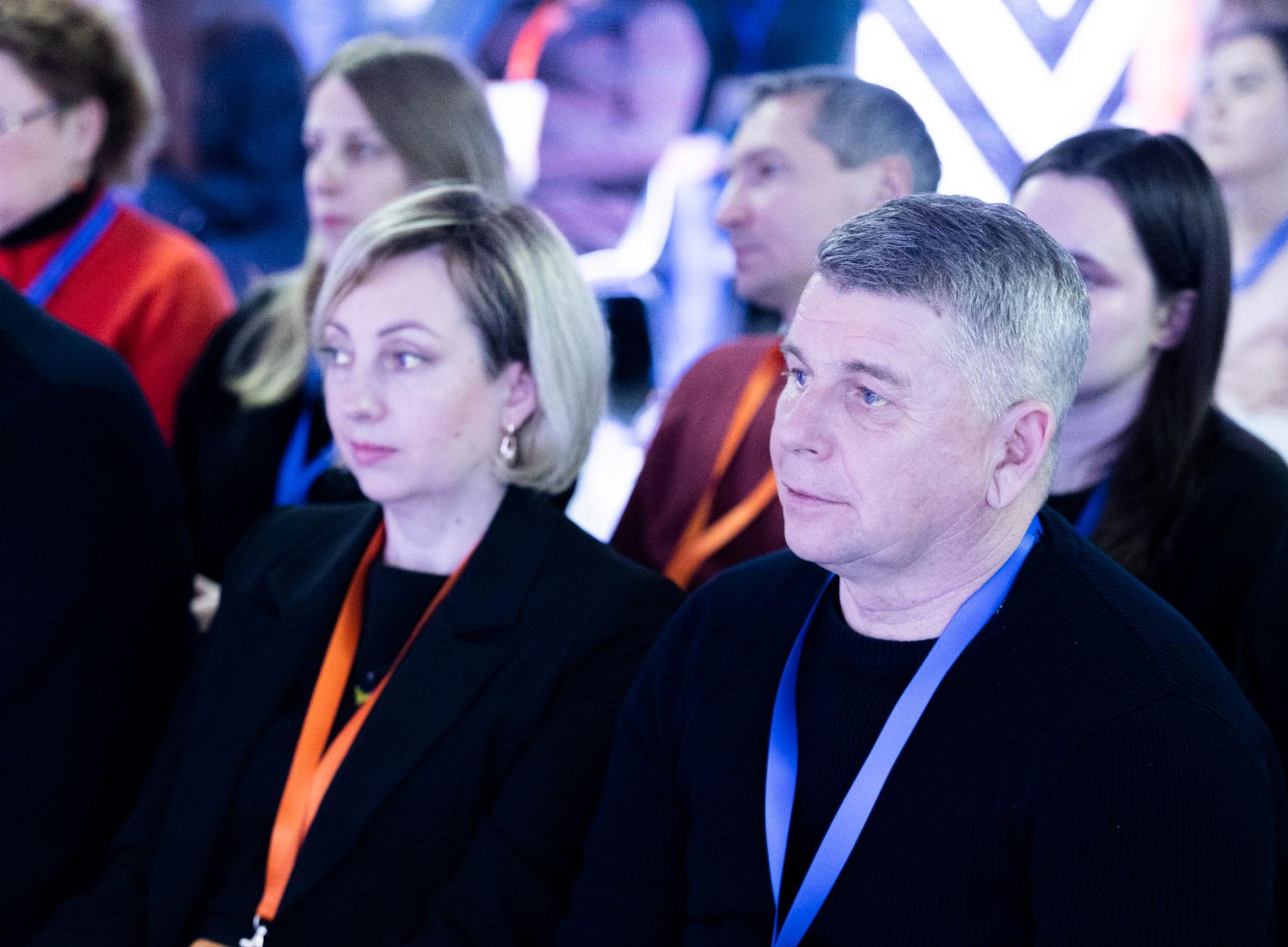
Recovery Media Conference audience.
How to jointly create recovery projects?
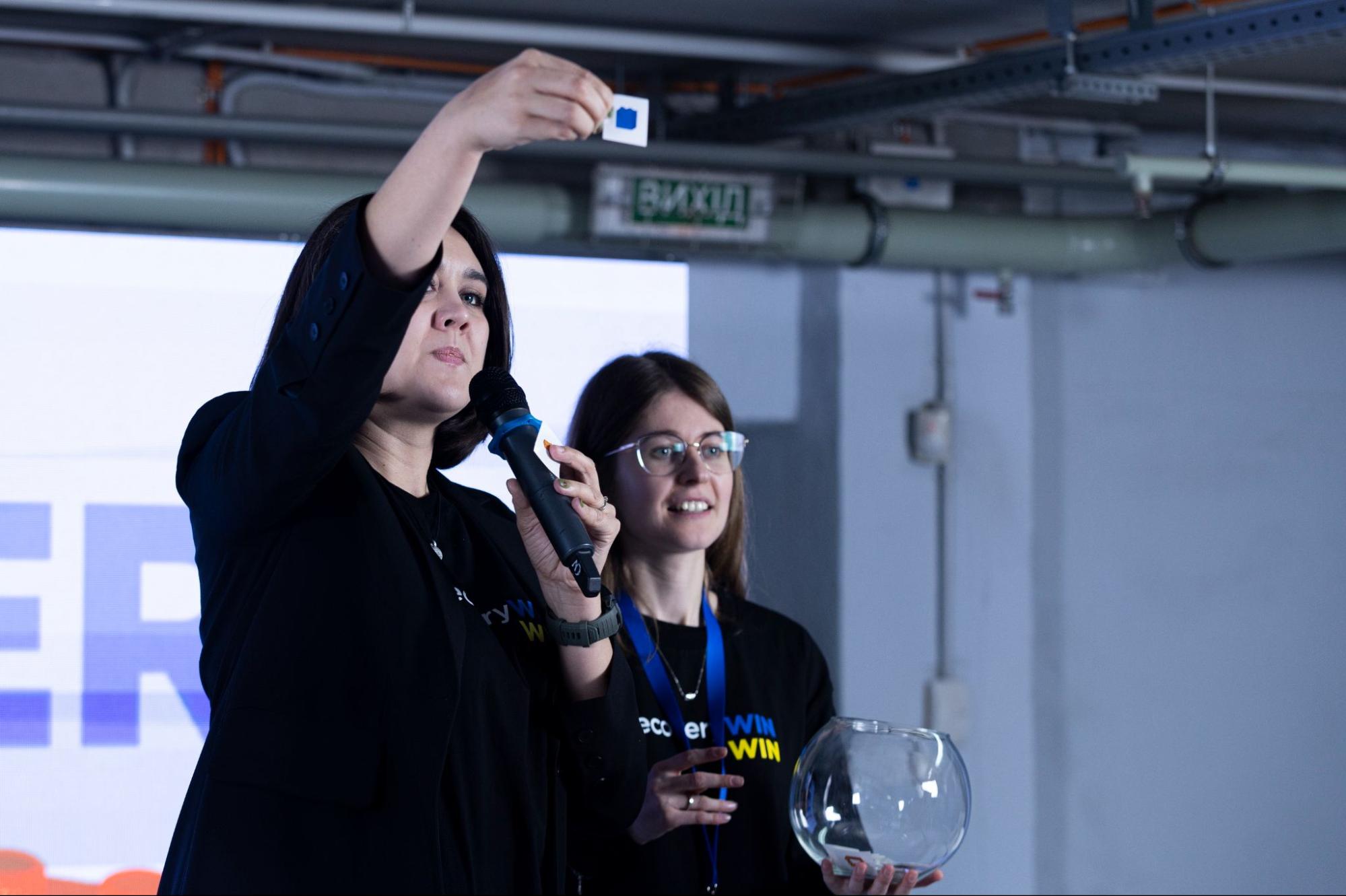
The host of the event, Anastasia Ivantsova, and the coordinator of Recovery Window explain the rules of the brainstorming: participants are divided into groups according to the stickers they received during registration.
During the conference, the participants held a joint brainstorming session. Journalists, volunteers, activists, and representatives of donor organizations united to create several new projects. Among the ideas are a series of materials about the seriously ill people of the Donetsk region and the active youth of Ukraine, an anti-fake campaign, and a platform for business, government, civil sector, and media communication.
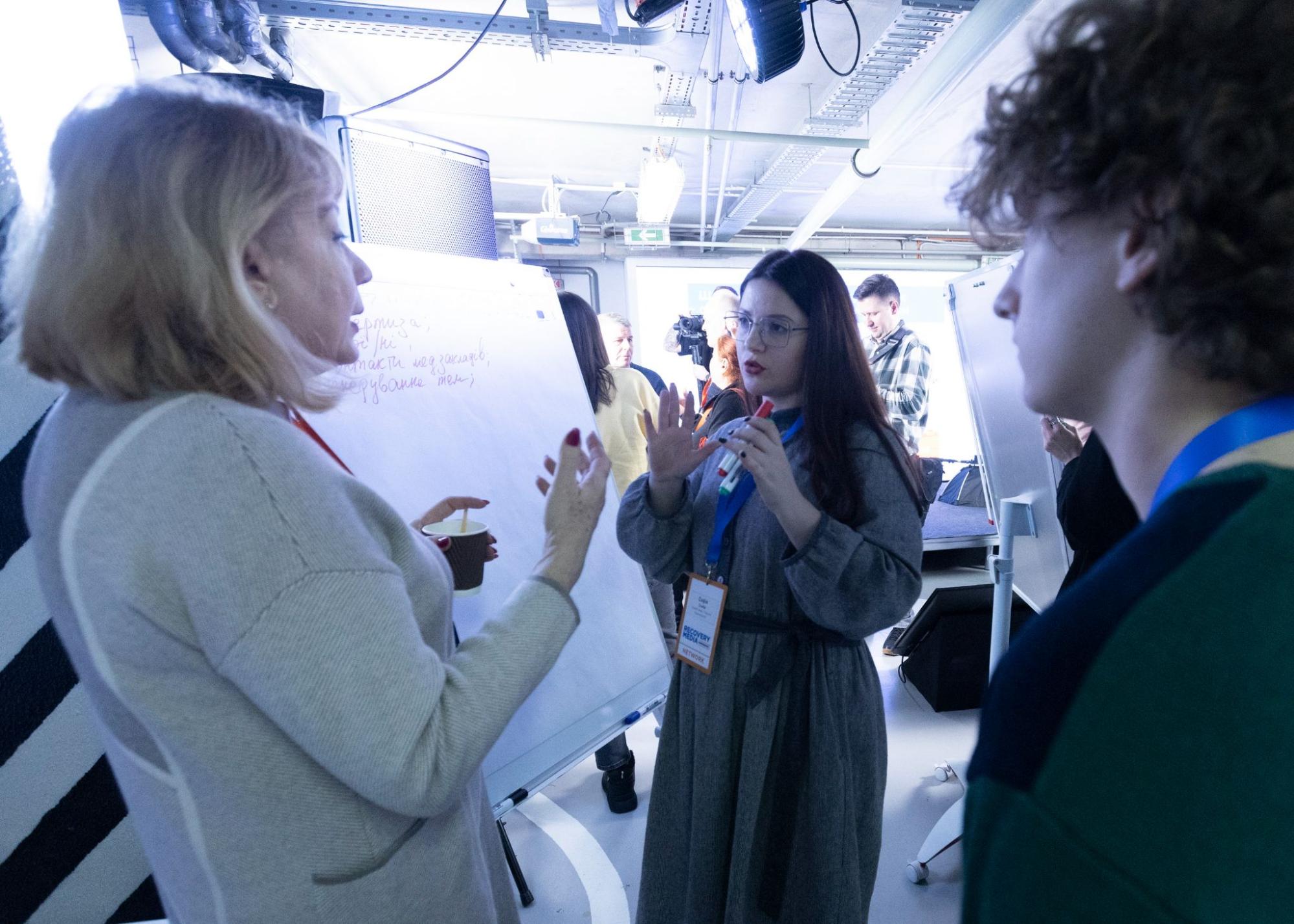
Teamwork in the creation of the project.
The organizers invited the teams to continue working on the projects further. They will be able to send a detailed plan of the initiative to the Recovery Window. The best projects will receive grants for implementation. Those whom the media network will not be able to help financially will be supported with information.
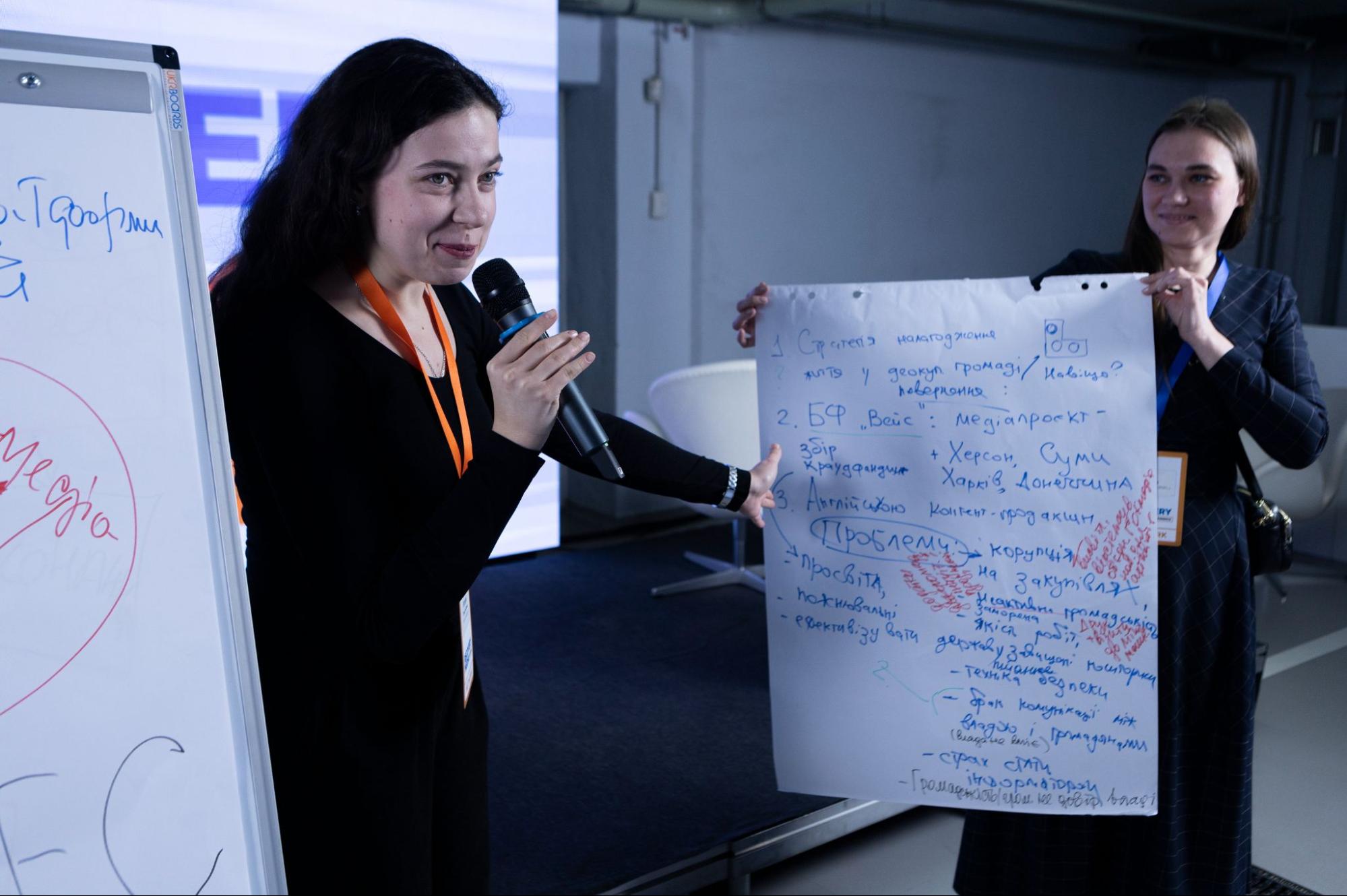
Teams present their projects.
The Recovery Media Conference brought together the key stakeholders of recovery in Ukraine. Representatives of the media, government, and the civil sector shared their experiences and sought ways of effective cooperation. The bottom line was that recovery is a common goal, and everyone from their side should make maximum efforts to make it high-quality, efficient, and fast. As one of the speakers noted, it is, first of all, necessary to be honest with yourself and your dialogue partners.
Photo: Mykola Tymchenko, Rubryka







